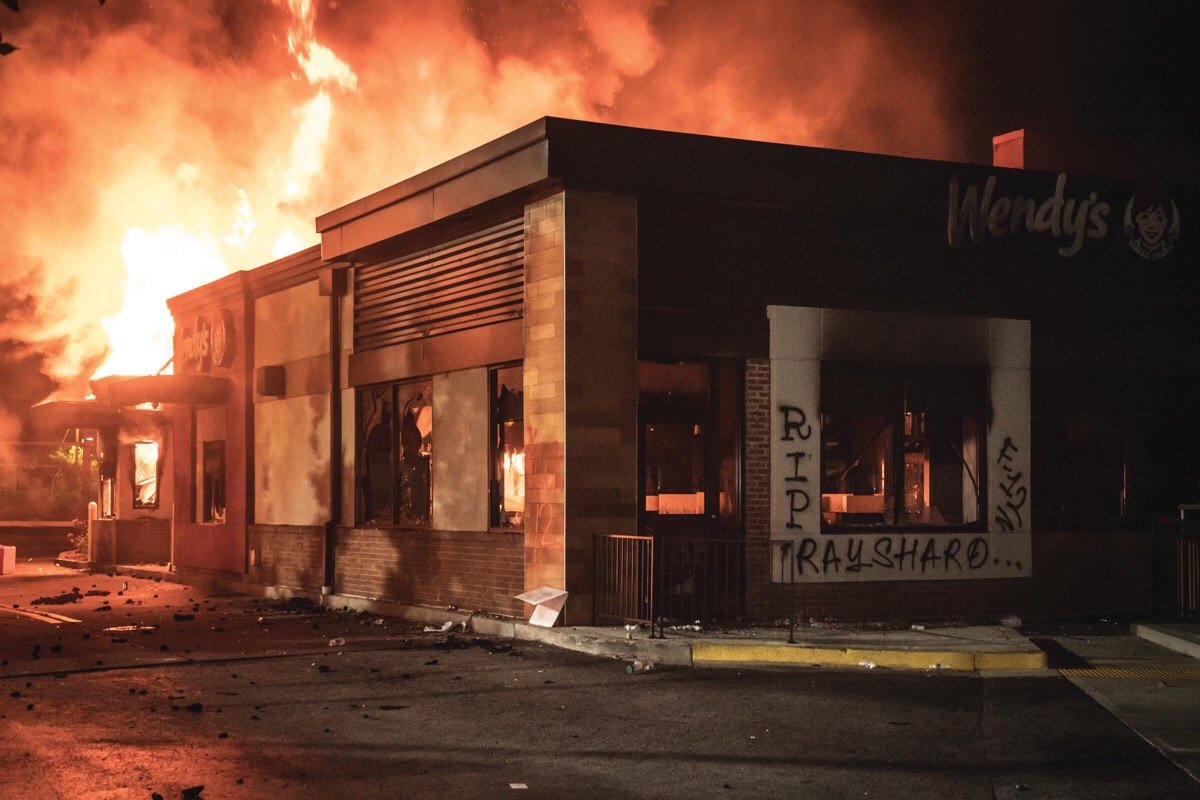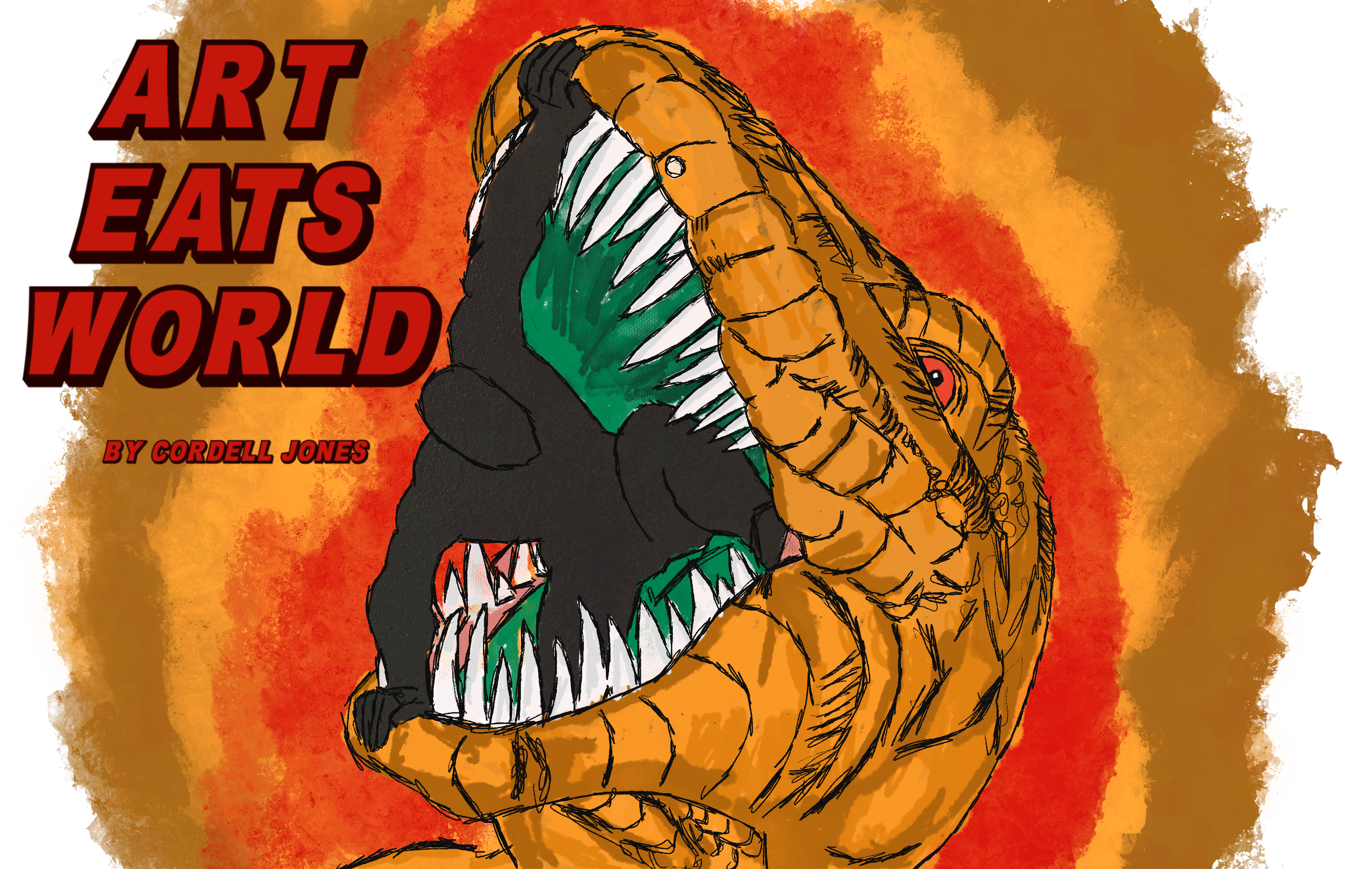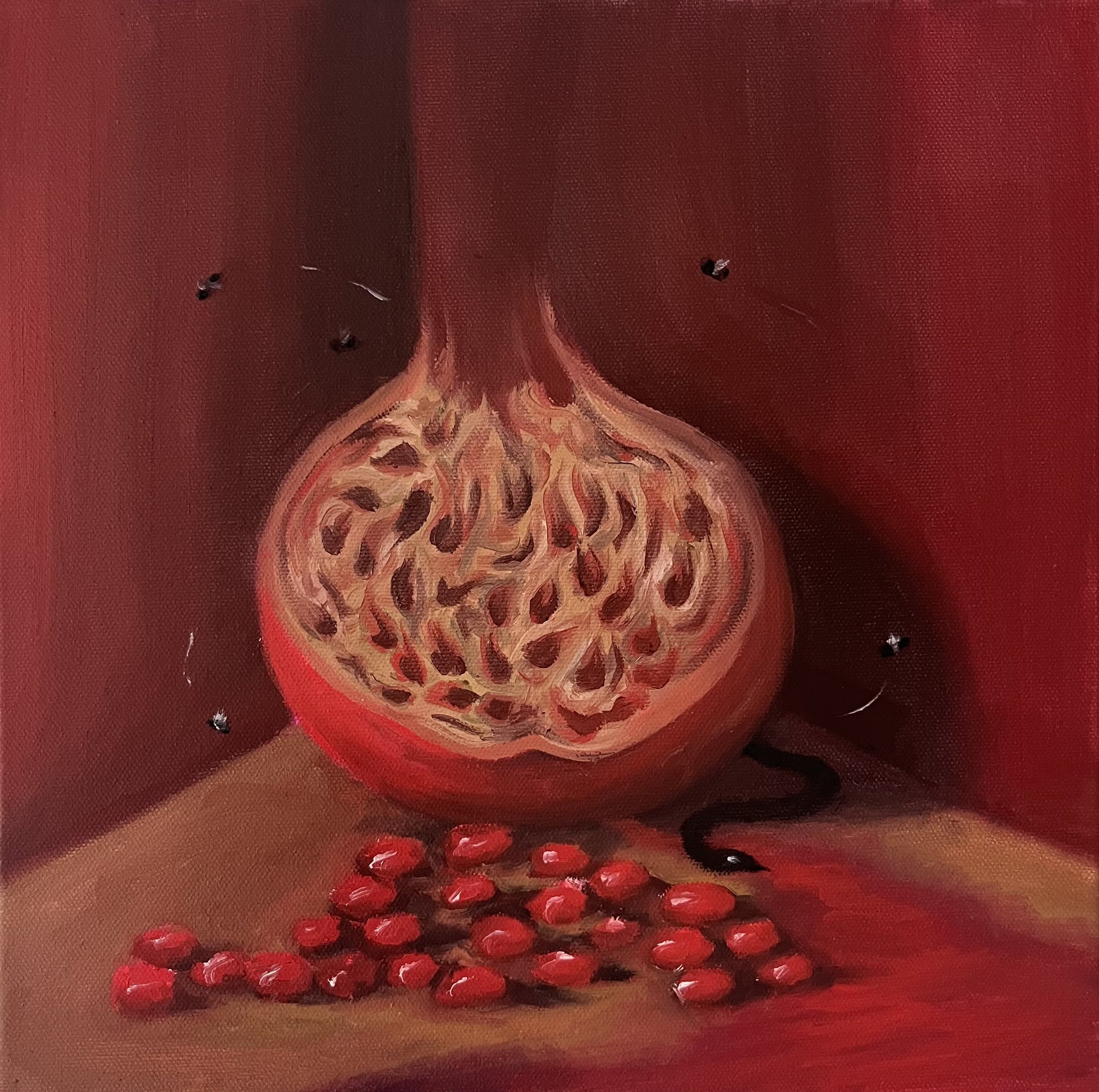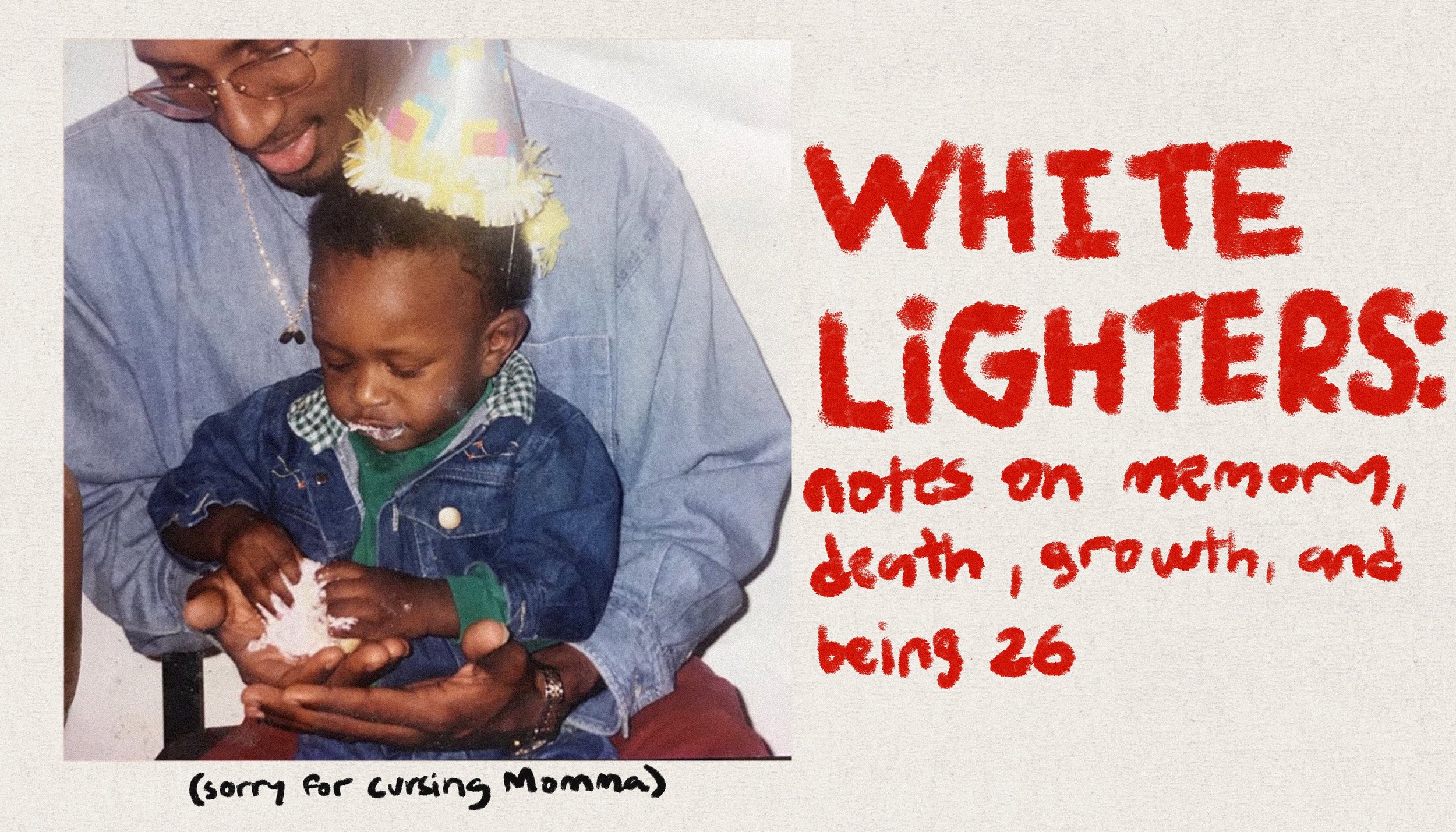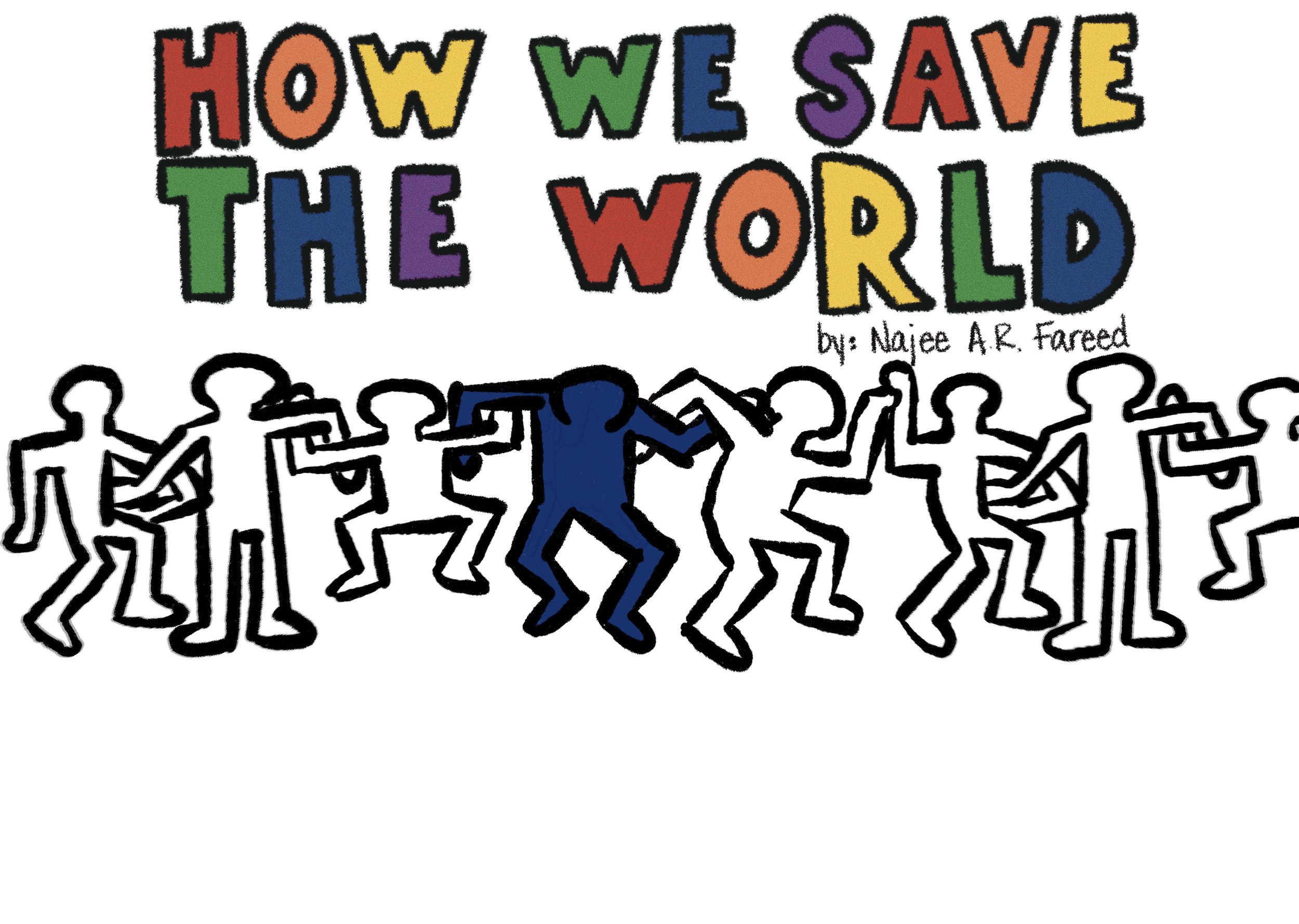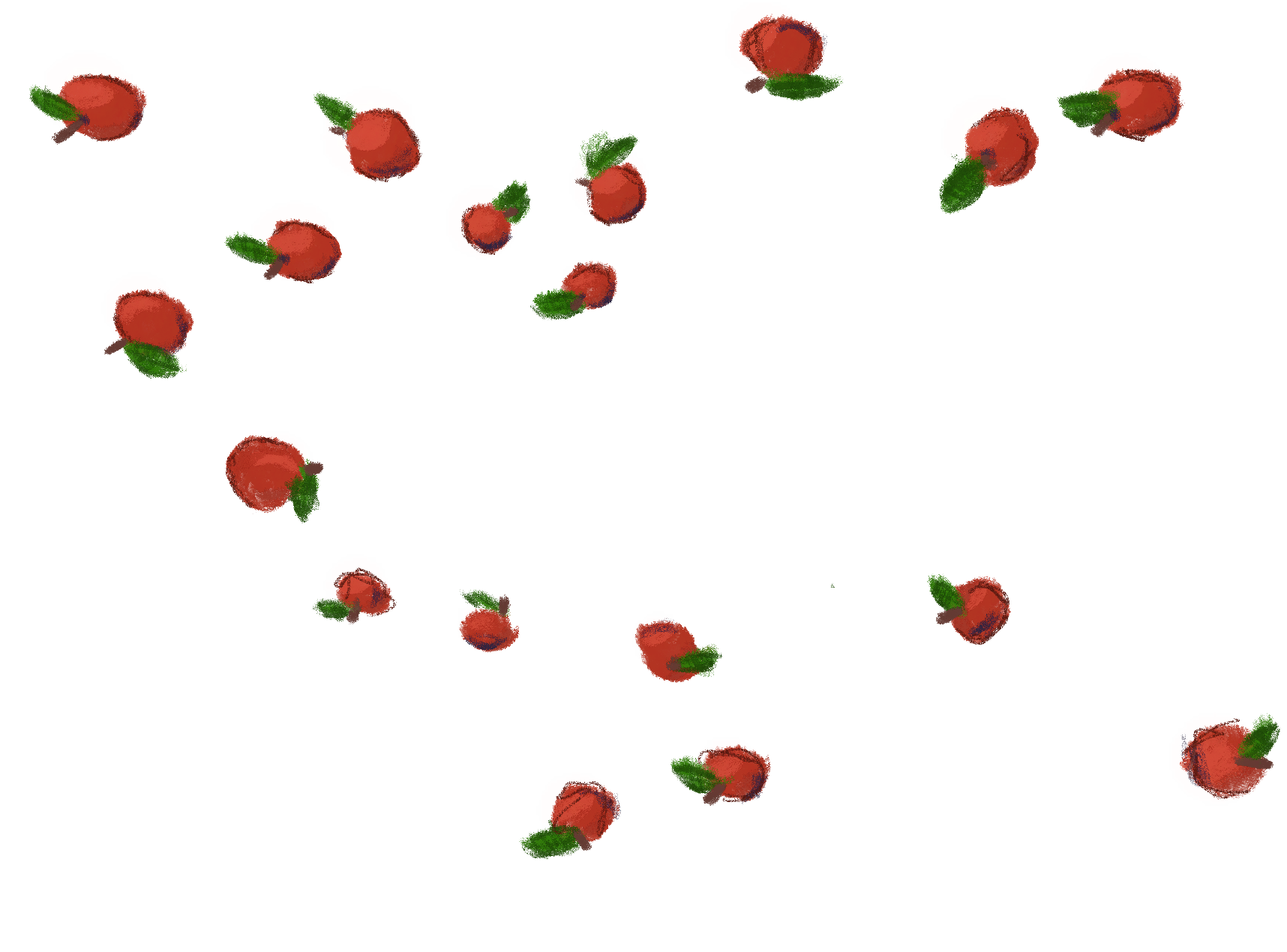
APPLES is a space for contributing writers to bring us their expression and art.
No knowledge is forbidden here.
Stairway To Heaven: Dream Logic vs. Mythological Reclamation [How to Explain A World]
What inspired my upcoming novel and how did I come to organize those influences? There's a trickster spider in my head. This may be an exercise in futility.
published September 11, 2024
image by Jalen Amir King
“It may simply have been that I had grown tired of coming and going. It is terrible to forever remain in-between.”
The Famished Road by Ben Okri
My novel began with an image, a sound, and a separation. At the top of 2021, while watching Stanley Kubrick’s 1968 classic film, 2001: A Space Odyssey, I felt immense empathetic sadness watching old Dr Dave Bowman rot with the monolith at the foot of his bed. I imagined a life where one was perpetually trapped in that moment of isolation, confusion, and loss. A room took shape in my mind, mired by the promise of being alone and being forgotten. Based on what I’ve learned about prisons, from reading and hearing first-person accounts as well as research, the primary obstacle in cases of restraint is often the self. As a Black man in the United States, restraint is a permanent state that I am well-accustomed with and I’m equally versed in the gratuitous internal mental battles. The protagonist of my novel was born from that understanding: a Black male trying to navigate his burgeoning nonexistence.
But a character isn't a story. Narrative is a structure of desire that requires a driving force. According to Susan Stewart’s On Longing:
I look at two devices for the objectification of desire: the souvenir and the collection. The souvenir may be seen as emblematic of the nostalgia that all narrative reveals- the longing for its place of origin. Particularly important here are the functions of the narrative of the self: that story’s lost point of identity with the mother and its perpetual desire for reunion and incorporation, for the repetition that is not a repetition. The souvenir seeks distance (the exotic in time and space), but it does so in order to transform and collapse distance into proximity to, or appropriation with, the self. The souvenir therefore contracts the world in order to expand the personal. (page xii)
Stewart postulates that narrative assumes a return and while this is extremely relevant to contents of my novel, this reading isn't where my story grew from. I’d scribbled preliminary notes and doodled a series of rooms in the weeks after I watched 2001: A Space Odyssey but nothing else had come to mind. I found my answer while listening to “Stairway To Heaven” by The O’Jays. I knew that I had to introduce a striving component to my nonexistent character in order to give them body and life. The O’Jays’ song is about ascending through life to an idyllic, godly stopping point. I combined this with my concept of the lonely room and found a tragedy of man: one destined to fall short of becoming. This man would be ignorant of his falling and fall because he’s ignorant. It’s a cycle of many.
W.E.B. Dubois wrote about the cycle in his essay “Of Our Spiritual Strivings” published in his 1903 collection, The Souls of Black Folk. The central idea of the essay was that of double-consciousness. He writes:
It is a peculiar sensation, this double-consciousness, this sense of always looking at one’s self through the eyes of others, of measuring one’s soul by the tape of a world that looks on in amused contempt and pity. One ever feels his twoness- an American, a Negro; two souls, two thoughts, two unreconciled strivings; two warring ideals in one dark body, whose dogged strength alone keeps it from being torn asunder.
These fighting souls are characterized by Dubois with a metaphor of a veil and a mirror. One half of a Black soul only sees themself through the eyes of others and the other doesn’t see themself at all. Dubois describes the spiritual striving of the Black soul as a desire to “go from two to one. To escape death and isolation.” My character has two selves occupying two different worlds in the story: an ignorant self and an absent self. I built this dichotomy based on the question: how many slices can you take from a pie until it becomes not a pie but a slice of pie? Once I recognized the separation sustained by the cycle I’d dreamt up, I had: a character, a situation, and the desire necessary to spark those elements into narrative. However, I did not have a world or better yet; the means to explain the world and render it completely.
Fantastical stories were always the ones that held my attention. As a child it began with Anansi the Spider folktales and eventually spun out into the Harry Potter series. As an adult reader I’ve been attracted to the works of Toni Morrison, Kurt Vonnegut, Haruki Murakami, Gabriel Garcia Marquez, Zadie Smith, Yoko Ogawa, Toni Cade Bambara, and more. These authors are known for pursuing magical realism and fantasy in an “elevated” and literary fashion. While I respect their influence on my writing, that seed of Anansi is always there for me. I write with a trickster spider in my head driving me nuts, a spider who according to some Akan tales was responsible for the very moon in the sky. The distortion necessary to animate and communicate my ideas were rooted in fantasy. For me, the fantastic has been split into two distinct modes: dream logic and mythological reclamation.
Dream logic is a well-understood and well-studied idea but what does it mean when applied to narrative and world-building? In the context of my novel for instance, the room eventually evolved into a plane of dis-reality. This is the “world” of my protagonist’s absent self. Dreamers employ the capacity to create, perceive, recognize, and destroy in an instant. This transient quality was essential to capture both in the prose and explanation of the world I was creating, a place that was essentially no-place at all. A dream renders, distorts, and betrays with bizarre certainty. It has the gumption to ask “what if?” rather than offer an alternative that fits nicely within what we consider logical. Reason is abandoned but so is time and space. In a narrative sense, this allows for an escape of linear thinking or plot and the ability to recognize the fantastic as it is rather than question how it came to be.
This method of creation did not go over well in my MFA fiction workshop at all early on, the mature educated mind has been trained to seek rationality, even in real circumstances where there are none. Being believed is often the first hurdle of any writer who wants to write respectable magical realism and I bypassed that, completely disinterested. I wished to fail at creating a world that worked and held no belief in coherence in the early draft. I’d abandoned what bell hooks described in conversation with Alison Saar in Art On My Mind as a “longing for linear order,” both in my writing and my life. In a way, I went into the class and said, “let’s all agree the sky is red” and everyone pretty much screamed back, “fuck no, fuck you!” Even worse, the separate world of my protagonist’s ignorant self also contained irreverent departures from our reality and my workshop had come to the conclusion that those departures needed to be parsed from the narrative in order to anchor the belief of any [respectable] reader. Intellect scowls at negative capability. I was somewhat devastated, not because they didn’t like it, many confessed to being enamored by the prose alone. I was let down because I felt as though the spider in my head drove me too far from a point of strictly logical connection.
I was uncertain of my novel at this point and considered shifting to solely writing short stories, where the weight of suspended disbelief is borne for less time. Then my thesis advisor, who’d returned with similar notes as my workshop after reading the first eighty-five pages of an earlier draft suggested I read The Famished Road by Ben Okri. I was familiar with Okri from short stories and selected excerpts of his fiction from essays written about ideas present in his work but I was completely uninitiated with the text. How thrilled was I when the text was lush with language and asynchronous and tear-jerkingly imaginative. Here is an excerpt from the novel and a strong example of dream logic imposing itself on fiction:
I said nothing. She lifted me on the shoulder. I could still see the head of the woman. I could still hear the voices in passionate gardens, could still hear their sunflower cantatas. I saw delicious girls dancing tarantellas in fields of comets. The woman’s head turned to give me a last smile before she vanished altogether in a Milky Way of music, floating across a lake of green mirrors. Mum took me home over the mud and wreckage of the street, over the mild deluge, under the arpeggio of watery stars. She was silent. I smelt the gutters and the rude plaster of the corroded houses. Then all I was left with was a world drowning in poverty, a mother-of-pearl moon, and the long darkness before dawn. (page 308)
Upon reading, I found that the dream logic I was set on wasn’t doomed but I did need to reorient how it worked. As I mentioned earlier, a pivotal action of the dreamer is recognition, and I needed to collect souvenirs that the reader could recognize even in the world of my protagonist’s absent self. Susan Stewart wrote in On Longing, “...narrative here seeks to ‘realize’ a certain formulation of the world. Hence we can see the many narratives that dream of the inanimate-made-animate as symptomatic of all narrative’s desire to invent a realizable world, a world which ‘works.’ In this sense, every narrative is a miniature and every book is a microcosm, for such forms always seek to finalize, bring close to, a totality or model.” There needed to be impositions of time and space and memory- which are present in dreams- but instead of obeying these impositions, I had the responsibility to destroy them and their connection to the protagonist. To realize the absent self, it was pivotal that I communicated what was being lost by the ignorant.
The world of the protagonist’s ignorant self is less ambitious and closer to the one we know but is well-acquainted with the surreal and the uncanny. Marie-Helene Bertino wrote in her craft essay “A Master Class in Disrupting Realism and Making Magic”:
I use supernatural elements in my stories and novels because they most adequately render what I notice about memory, trauma, disability, class, ongoingness, and what we mean to each other. Many of my stories are in present tense with present tense flashbacks because of what I’ve noticed about life and memory, that to remember something feels like reliving it.
At a different point in the essay, Bertino explores a method she’s employed to gauge levels of magical fiction. The scale goes from one to ten. One designates a story that could plausibly happen in real life exactly as it is told, nothing false is rendered except for the circumstances and characters. A ten would be assigned to a fantasy story where the entire world is invented and bears no immediate relation to reality. Bertino’s examples of a “one” include: the work of James Baldwin, the work of Jane Austen, and the work of Edward P. Jones. Bertino’s examples of a “ten” include: the work of Kelly Link, the work of Stephen Graham Jones, and the work of Octavia Butler; specifically Blood Child. My MFA fiction workshop and thesis advisor essentially came to the conclusion that because the dream-like nature of the protagonist’s absent self’s world was a “ten,” then the ignorant self’s world must be a “one.” The suggestion struck me as rational and logical and I almost relented until the spider in my head started bouncing around and suddenly I’d written thousands of words about an ignorant self that occupied a world at odds with nature itself. There are plagues, biblical storms, rough beasts slouching every which way, and curses aplenty. I hadn’t produced a “one” as they’d asked but maybe a “five” or “six” at the lowest. However, I did discover a way to give the surreal elements from the ignorant world a different texture than the absent one. All the surreal elements of the ignorant world employ a tool I’ve named “mythological reclamation.”
The idea has been present for centuries, most pronounced in African and African-American folktales. Mythological reclamation is another word for “lying,” which is what the storytellers in Zora Neale Hurston’s Mules and Men call their craft. Rather than create a skewed thing from nothing, mythological reclamation substantiates and explains what already exists. It supplants, supports, fills in, takes back. Why does the snake have its venom and its rattle? They asked God for it because it ain’t like being stomped up. Why does the woodpecker have its red head? Noah struck it with a hammer for trying to poke a hole in the ark, which is where the possum lost its tail too- Noah’s son Ham used all its hairs to make a banjo! Broke the possum’s spirit. The gator and the dog stopped being friends because Brer Dog cut the gator’s mouth all ugly-like. Usually whichever lie was better or more interesting superseded what came before as the new truth. Some truth is very old. The first Anansi story I learned came from an Akan folktale and is about his six sons using their tools to save him from a bird. Each son contributed in a different but arguably equally important way. Afterwards, Anansi found a glowing white orb and wanted to give it to the son that saved him, but all six had saved him. He asked their God of All Things, Nyame, for help and Nyame put the orb in the sky and it became the moon. These are all excellent examples of mythological reclamation because they satiate unsolved curiosities but with the fantastic, not logic!
Another concept in the novel rooted in folklore concerns the protagonist. Zora Neale Hurston’s Mules and Men describes the concept of Jack or John in the “lies” told by southern African-American storytellers:
Jack or John (not John Henry) is the great human culture hero in Negro folklore. He is like Daniel in Jewish folklore, the wish fulfillment hero of the race. The one who, nevertheless, or in spite of laughter, usually defeats Ole Massa, God and the Devil. Even when Massa seems to have him in a hopeless dilemma he wins out by a trick. Brer Rabbit, Jack (or John) and the Devil are continuations of the same thing. (page 247)
I wanted to write about a Black wish fulfillment hero who is trapped in a vicious cycle of curses and blessings. There are no memories of his feats, neither internal nor external. I found a Moses moment deferred, a people who thought they were chosen but instead left behind. I was curious where that would leave a man, now woefully beholden to the adolescent sadness of isolation.
The chief curiosities being reclaimed in the ignorant self’s world concern the history of families similar to my own. I grew up with one Grandpa and four Grandmothers. The disparity always seemed odd to me and as I grew older, I started seeking answers, thinking maybe it’d explain me to myself. But real life is jumbled and there is no linear order. I found more gaps than verified truth. The protagonist of my novel lives the exact same amount of days as my sole Grandfather did, the most I can expect as of writing this (following a hereditary tradition). I’ve consulted a composite of theology, theory, folklore, film, art, poetry, memory, lies, gossip, history, literature, scriptures, and traditions to explain the world I’ve been given and reclaimed everything else with my imagination. Through the surreal I am able to escalate annihilation and follow it to a natural, if not unrealistic, end point.
The novel is currently incomplete and unsold. I have no literary agent. This essay may prove to be an exercise in futility. The narrative currently traces the history of a family curse from origin to eschaton and how a single man forgetting it all tries to restore himself to escape death and isolation. It’s about recurrence, awareness, motherhood, love, acceptance, music, sunshine, sadness, and where cathedrals form. It’s subtly inter-related. Sometimes I like to say I see the world as it was presented in [non-fiction] scriptures like the Bible or Qur’an: the Queen of Sheba, Adam, David, Solomon, Adam, Eve, Jesus, and Moses all doing incredible things through the will of God. All is possible. But I’m not sure I believe that. Like everyone else, I have things to reconcile. The novel is my attempt to explain why every change I've undergone in life has always felt like loss. Truth be told, I’m unsure if I’ve ever gotten over anything in my life. I dream and create things I don’t fully understand. This lack is where I feel most whole.
I have a trickster spider in my head spinning stories, teaching me worlds, and turning everything to eleven.
leap years, almost three months, some days
I have not been crying lately. Why not? tick tick tick tick
published May 19, 2024
Winslow Homer, The Gulf Stream (1899)
It’s a taurus Tuesday night, I stand in the kitchen and watch water boil, oblivious to everything but the Friday afternoon I was caught shoplifting at the East Lake Publix wearing my Boy Scout uniform. It must have been 2011, because everything happened to me when I was 15 years old. Troop 706, I was decked in full paraphernalia- sash, patches, boots, neckerchief, handbook. I led a Cub Scout troop after-school, for five dollars a meeting, about once a week and we were going to Bert Adams campsite for the weekend. No money, no snacks. A simple calculus, but I was not stealing out of hunger or necessity. Gushers, chips, cookies, halal marshmallows, gatorade. The man who caught me was an older brother from the masjid and a plain-clothes employee of the grocery store disguised as a shopper. I was crouched over my bookbag, shifting loot when I heard his voice from behind:
“What are you doing man?”
I stopped, startled, and tried to offer an explanation or a lie but nothing came. He encouraged me to give him the stuff and he sent me on my way without alerting management. An unpronounced sin, a silent transgression. Over the coming months, I saw the man at the masjid on occasion and he was sure to ask me questions about myself. He learned I wanted to be a writer (always) and invited comparisons to great Black American scribes, exalting me as “the next James Baldwin.” I wasn’t familiar with Baldwin at the time, likely unschooled in his oeuvre because of Baldwin’s sexuality. For years the brother told me three things every time we spoke: that he’d buy my book when it came out, that we should go fishing, and that I would be the next James Baldwin.
By that point I had written four books in composition journals cover to cover, while I was supposed to be doing my math classwork. I thought I knew all these things I simply didn’t and had only been fishing once, on a different Boy Scout trip with a bunch of other east side Black boys. I was the only one to catch a fish. My first experiences reading Baldwin were still a few years out. We never went fishing together, he and I.
I’m no Baldwin.
Lately, I’ve taken to watching basketball on mute. I don’t really understand why, the crowd and the calls are among my favorite aspects of the viewing experience but this deprivation helps me think. The players on screen, while familiar due to my unrelenting passion for watching the sport, don't seem to belong to me the way the players of my youth did. And the new players are getting the older players out of here, quickly. LeBron, Durant, Curry, Westbrook, Kawhi, Lillard, Harden. None advanced past the first round. I actively rooted against some of these players in years past and now, as they fail to live up to their former glory, I sink into my couch feeling sorry for the time where my allegiances lie and silly about my sorriness. The feeling isn't completely foreign, 2012 was also a significant changing of the guard. Similar emotions found me when I watched the young OKC Thunder overwhelm Kobe and the Lakers (Dirk and Timmy too) and when LeBron vanquished the Big 3 Celtics once and for all. Watching them come to age around the same time as I felt important and I found kinship in that. Now watching them go out of fashion (more gracefully than ones from before), I still feel a guttural hunger to become, wondering if my best days have already passed me by.
I remember the summer of 2012, when my older brothers and I rode around Kansas City with a basketball goal and four fifty-pound sandbags fastened to the back of my Dad’s forest green pickup truck, hunting basketball games. Twice that summer, our family reunion and July 4th, those games ended with bullets and the threat, the loud whisper of death. I recall college nights spent in ritual at the free throw line: I needed to make ten consecutive before I could sleep. The routine was born from a desire to gather my thoughts, more meditation than practice.
I listen to “Euphoria” by Kendrick Lamar. It feels like an important moment in the history of Hip Hop. I think of my brother’s ‘95 Thunderbird and the backseat, where I fell in love with rap music for the second time at 15, bumping bootleg copies of Watch The Throne and Tha Carter IV. Memories of music rock me back and forth through time like an aimless dinghy at sea a la Winslow Homer’s The Gulf Stream. “Tomorrow” by The Brothers Johnson: I’m walking under the rain in Boerum Hill. “Hold Me Down” by Daniel Caesar: I’m having dorm room sex. “Don’t Worry About A Thing” by Stevie Wonder: I’m rounding the corner on Wesley Chapel Road, leaving my love for the final time before moving to New York City. “Green Eyes” by Erykah Badu: the sun sets in Rome. “Both Sides Now” by Joni Mitchell: downcast eyes look in the mirror and recognize the years on my face. Big smile. Age has come, rebellion wanes… it must not die.
Pathology, the science of causes and effects (of disease). I’ve been toying with the idea of sacred lightning, memories there only for a moment but powerful as all hell. Like a last kiss unfurling back to the first one. Images of Anton Ego finding his mother in the first bite of Remy’s ratatouille comes to mind (Ratatouille, 2007). I wonder where the years have gone and what they’ve brought me aside from this sacred lightning. Where are my lessons? I’m still trying to be gentle first and honest later, still refusing help, still needing it, just still. Lightning must beget thunder. Distant, solitary, stony, punctual, lingering thunder.
Whenever my mother and I visit her old friends, they always describe me as “the crybaby.” Momma got hella kids so that serves as their key differentiator. They regale me with tales of my never ending infant sobs. I don’t remember those years, but I remained quick to cry as years went by and without shame. In middle school I’d weep at my desk when I got C grades, arm crossed over my face like Cabanel’s Fallen Angel. The tears were never happy; usually brought on by melancholy, movies, music, heartbreak, or infrequent madness. As of now, I have not cried since February 29th, 2024. 80 days. February 29th, a date that would not have happened any of the past three years. The leap year tears were brought on during a viewing of Rosewood (1997), summoned by an anger concerning the heavy content of the plot rather than any malfunction in my own life therefore not belonging to me. Still, it’s the only time I have cried this year. As my life falls apart (since I’ve become 28), cries swell in my spirit like a sneeze that won’t come out. I’m drowning in things unsaid. Desire, admission, disappointment. I don’t think I’ve given myself permission to win, as most writers haven’t (word to Toni Morrison), but I refuse to lose. Mostly though, there is a general anxiety cloaking everything I have akin to a stillwater marsh hiding cattail stalks. I’m like Captain Hook being chased by the ticking crocodile. Tick tick tick tick tick.
The water boils. I’m at the mouth of my kitchen compiling notes for my first novel, feeling like unsigned hype. I crack the spine of Giovanni’s Room by James Baldwin and jot down a phrase shared early in the first chapter: “People are too various to be treated so lightly. I am too various to be trusted.” I finger the boldly inked underline, humming the words along its imprint. My eyes threaten tears but they don’t come. Some days I think they’ll never come again. Being a young, sometimes angry Black man is a strange panic and I need my tears now more than ever. I’ve been told to toughen up, stop crying, and be a man my whole life and now I’m all dried up. It’s making me miserable. Life’s too hard to be strong, unloved, and alone. Il faut choisir une lutte.
I think I’ve got my hands on the steering wheel though. I’m eating my veggies, getting some sunlight, listening to music, telling my people I love them. As far as matters of control, I’ve learned that it’s a circular prism and at each end, things are either too big or too small for me to hold in these hands.
No fear. The world ends any day now.
Alexandre Cabanel, The Fallen Angel (1847)
published May 19, 2024
pilot light
I kept a diary (?) during my three weeks in Europe, thoughts and such inspired by Wes Anderson, James Baldwin, Anthony Bourdain, new experiences, Roman food, and the Parisian sunset.
published March 4, 2024
This diary-style account of my trip to Europe from January 18th (despite the trip having started on the 13th) to February 1st is largely inspired by an interview between Wes Anderson and Susan Morrison, initially published in The New Yorker and subsequently in the nonfictional anthology, An Editor’s Burial. The interview, titled “The Pilot Light (Or: Missing Something Left Behind),” was structured around Anderson’s film, The French Dispatch. Two central ideas from the interview stayed with me and influenced my decision to keep a journal over my travels. The first was introduced by Morrison, invoking Harold Ross (The New Yorker’s founding editor), who said “when you’re out of your element, or in another country, you have a different perspective. It’s as if the pilot light is always on.” The second was Wes Anderson quoting Nescaffier on his experience as a foreigner: “seeking something missing, missing something left behind.” Given the title of the interview, Morrison also correctly realized that those were the most arresting thoughts present in their conversation. This project is my dramatic way of making three weeks feel like a life and maybe the perfect way of remembering. Leave nothing behind, even if I’ll never see it all.
J’ai acheté ce cahier lundi dernier. Aujourd'hui est le jeudi 18 Janvier 2024. Je suis à Milan, en Italie. Et je suis un peu triste. Mais c’est un bon voyage. My friend and traveling companion over the past few days left this morning. I am lonely and I miss her. Paris was a lot of fun and I am not entirely sure if I can make it through the next two weeks alone. At least not with my sanity intact. I am going to chronicle what I’m doing and my thoughts over the remainder of this trip, mainly in an effort to spur some type of inspiration, writing wise. The internal highlight of the trip, outside of the obvious potential for new experiences, has been the uncertainty surrounding what I will do next creatively. I am blessed. I saw the Louvre. The fucking Louvre!! And the Eiffel Tower. The Crazy Horse show was so dope, it gave me some solid ideas as well. The French vibe was just so totally intoxicating and arresting, visually as well as the calm aura of the city. Really, truly, slid into that pace of life. Milan has been so different. It’s been cloudy but it’s also just as beautiful. The complete language divide (between the Italians and I) has been very alienating for me (as opposed to the elementary understanding of French I have). But overall, it was great when I had company. Without? Who am I? You know. This isn't so interesting right now. But just roaming around felt magical. I was drunk as fuck the other night. I drank a full bottle of chianti in like twenty minutes and my innocent liver almost fell out of my ass. I think I’m still dealing with the headache to be honest. Right now I am reading Chasing Me To My Grave by Winifred Rembert. I felt silly sitting around being sad for myself when someone like him had truly been through so much. He survived a lynching, I’m sad on vacation in Milan. Like? Boo-hoo? You had to spend a day in a Milanese laundromat then go eat pasta by the river and yesterday you spent the day at an arresting art gallery with a good friend. Fondazione Prada was OD fun. There were so many inventive pieces, it inspired me to create- both with my words and to create a system of being. I am desiring more again.
I just soaked in the hot tub for about an hour. I’m still kinda sad and dreading tomorrow. Hopefully my mood and/or disposition changes. I got some Italian comic books today and I bought a French edition of Naruto the same day I bought this tiny notebook. I’m not sure why I put off writing for so many days. I think I’m beginning to find the whole thing embarrassing, which is troubling. ROME TOMORROW!!
It is 2:28 AM on January 19th, I’m watching a shitty movie (Friends With Benefits), about to eat Gelato. I should be asleep. Am I happy? A lot more than a few hours ago, that’s for sure. It is 9:58 AM, I woke up in segments about twenty minutes ago. The morning is going smoothly. It is 11:44 AM, I have boarded my train to Rome, the hard way of course. It’s so foggy. I arrived in Rome about an hour ago, around 2:30 PM. It’s such an old city and has a very less obvious beauty, it is dirtier as well. I think I miss Milan although I like my hotel room. I didn’t do anything on the train but read Winifred Rembert’s book and inexplicably fall asleep several times. I am very hungry. The Italian countryside was gorgeous. Rome is a lot bigger and dirtier than Milan. I’m thinking about scouring Hinge, not for sex or anything, but just so I don’t have to be alone. Maybe I should go on TikTok like the young people do and find things to do.
J’ai mangé dans un restaurant dans ce quartier. It was recommended by the concierge of my hotel. “Il Tiempo di Minerva.” Which translates to “Minerva’s Time.” The food was fine, meatballs and pomodoro. But I’m sorta tired, feeling stressed, and dejected. Money and mental health rack my mind, same old same old but in Europe. I took on a lot (with this trip), hopefully not too much more than I could chew. I’m currently unsure if I should just stay-in and chill and relax or go out and see the city. Guilt will likely break me if I stay in this room with these walls. I’ve been trying to experience the cities I’m visiting, repeating “I may never see this again,” over and over again. I will decide what to do after a show. Fruit grows on the trees here, there is an orange tree and a lemon tree just outside my window. I feel like they speak to me. What do they say?
It is 8:26 PM. I am not going to go out. I am going to rest, take a shower and cut myself some slack.
It is 11:18 AM and I am finally leaving my room after wasting a full half day recuperating from my last few full days. My thoughts as I awoke about two hours ago then again about an hour ago: I hate the way European toilets are shaped, specifically the bowls. My late start is on-account of my bad habit of watching basketball, now many time zones away. I fell asleep during the initial game I was watching but I woke up around 4 AM and watched until 6:30 AM (Lakers game). I had breakfast in a neighborhood called Trastevere, just off the river. The restaurant is named “Le Levain” but it was more like a bakery. My breakfast was good, even if it left a bit to be desired as far as quantity. I had two little pizzas, two treats, and a wafer covered with fruit. 10 euros. I walked to a museum, Villa Farnesina, but I didn’t go in. I walked to the Sistine Chapel, but I didn’t go in. I walked to a consignment store/record shop named Rough Radio and bought a house mix vinyl record of “Dancing Queen” for two euros. I walked to a bookstore named Otherwise and bought a copy of Books v. Cigarettes by George Orwell. Eleven euros. I walked to the Parthenon. Didn’t go in. I’m at the Coliseum at 3:26 PM as I write this. I’m wearing my violet Hollywood Ranch Market denim jeans, violet Yitai corduroy worker jacket with sunflower buttons, my flower woven bucket hat, and my CPFM chopped Nike Blazers. I look like a blueberry string bean. Most of my walking has been accompanied by Erkyah Badu’s Mama’s Gun and Baduizm in my ears, trying to slow down my heartbeat. Everything is covered with a thin film of anxiety at the moment. I feel as though I am just trying to do enough to not feel guilty for going back to my room. It is sunny and windy and beautiful and I am blessed.
It’s a bit past midnight and my third in Rome has just begun. Really, I haven’t done much. But I have realized a lot of things. You cannot see all of Rome in a day and whatever day Rome was built was a very long time ago.
I’m off to another late start today and I’m hungry. Last night for dinner, I went to this place named Trattoria Vecchia Roma. The food was exquisite. I had some fancy mozzarella sticks (with basil), oxtail rigatoni (slightly undercooked but the sauce was to die for), and a side of French Fries because I am childish. The line was very long and the atmosphere inside was jumping, so I had to sit outside next to a heater. A woman on a date at the adjacent table gave me a compliment on my appearance. Today, as I write, I am at this cafè named Materia. It’s quaint and bustling, feels like a Sunday morning. It’s a sunny, still afternoon actually. 58 degrees and when I left the hotel earlier, “Alright” by Zapp playing in my ears, I felt like life and the sun on my face was sharing it with me. I ordered a roast beef sandwich and a cafè latte. I hope it’s good. (UPDATE: it’s good!)
After I finished my meal, I sat in a courtyard and read the last third of Chasing Me To My Grave, while Miles Davis’ Bitches Brew relaxed my ears and the sun washed my face. I feel lucky. I’ve spent so much time among the elements and they’ve accepted me.
Rome is a city of ruins, wide streets, cypresses, seagulls, palm trees, stone pines, and funny little cars. I walked amongst them for hours, mainly to the tune of Bob Dylan and Solange, before stopping here at Il Duca, for dinner. It’s a beautiful and warm restaurant, just off the water. I stopped at a few places before coming here, the penultimate spot was a supermarket, where an employee followed me around the store. I’m used to being followed in stores, it’s been happening to me since I was 10. What happened next, however, surprised me. Italy’s brand of racism has been well-advertised to me so fireworks and incorrigible people were built-in to my expectations. The man coming up to me, asking me questions about myself, apologizing for following me, expressing shame, and sharing about himself as well was not. He was from some city in South Italy, some city I didn’t recognize but he mostly wanted me to know that I didn’t do anything wrong. First, in Italian, then in broken English. It was a moment of prejudice, honesty, humanity, and ultimately understanding. I find myself thinking about it now, unable to fathom having made a similar mistake yet feeling his shame alongside him nonetheless. My other stop before Il Duca was back to Otherwise where I bought Ways of Seeing by John Berger. Sixteen euros. An Italian-only bookstore/bar named Underground was across the walkway and I perused their books for a while as well, before deciding not to purchase any of its foreign prose. I ordered the seafood risotto (Risotto alla Pescatora) and the lemon sauteed spinach (Spinaci in padella all’agro). Water (maybe free), bread (finally compris). As I finished my delicious meal, I couldn’t help but look around the room, buzzing with incomprehensible conversation and I feel alone. Adjacent to me, four friends share a bottle of red wine. Ahead of me, two couples on dates. And to my back, are loads of people, who I can only imagine are spending time with ones they love. I look up and notice my table is marked “17.” Lonely Table 17 with your lemon-scented moist towelettes and tiny scribble-laden notebook. I got my check, the bread was not free (lol).
I checked out of my hotel this morning, it was an easy if not rushed process. I was very sleepy on account of my decision to stay up until 5 AM watching the Bills vs. Chiefs (Chiefs won). Check-out was at 10:30 AM, I got out of bed a bit after 9:45 and had to speed-run pack. My outfit is atrocious today. I considered a re-do of yesterday: ash Carhartt jacket, Supreme shirt, Number Nine olive pants, Season 4 Yeezy boots. But I opted for a more relaxed and disoriented look, something more comfortable for my long impending train ride. I took Rome’s metro for the first time, to a pretty neighborhood called Prati, just off Lepanto Station. It reminds me of Harlem. I’d live there if I were to move to Rome. The weather is gorgeous, so I walked from there to a restaurant named Coromandel where I had breakfast. Cinnamon toast, scrambled eggs, and orange juice. The vibes are nice here. I will have a pleasant final day.
I am reading Swann in Love by Marcel Proust. I hope to still be reading it when I arrive in Paris on Saturday. Or to finish it on that day at least.
I’ve spent the past few hours listlessly leafing through my book, in the sun, staring at the river and listening to CTRL. It’s slow-moving jade water. There’s a docked tiny boat named “Salvataggio” right across from me. People jog by, bike, walk their dogs.
I feel a bit guilty because I wasted my last few hours of Roman sunlight in a big chain bookstore, “La Feltrinelli” (probably their version of Barnes & Noble), mooching off the free Wi-Fi. T-Mobile slowed my data after I hit five gigs. I need Wi-Fi for fast or powerful service until Friday. Travel things.
I decided to cop dinner, my last in Rome, at Ivo a Trastevere. It’s a pizzeria, I’m getting the Buffalo Bill: tomato, mozzarella, basil, cherry tomatoes, and parmesan cheese. There’s an excited Australian trio of friends sitting just a few paces ahead of me, but aside from that, I am alone at the far end of a packed restaurant. Even still, today, I don’t feel so alone.
Bonjour! This morning niggas woke up in Brig (Switzerland)! I took the overnight train from Rome to Milan, had a difficult transfer but made it and now I am waiting on the next available train, hopeful to make it to my train to Lyon on time. The trains didn’t have Wi-Fi so that was an obstacle but I got some solid sleep without the allure of American sports. I had a racist and unfortunate experience with a cop rudely pressing me from my sleep and demanding I show documentation. I was confused at first (sleep, language barrier) but once I produced an American passport, his tune changed. I should be having a bad morning, but I’m not. Brig is sunny and has the most beautiful mountain I’ve ever seen. While pushing my heavy luggage up the steep ramp incline, I caught myself staring at its peak and couldn’t help but imagine what it would feel like beneath my feet. I was a bit sad, leaving Rome last night. Change always makes me weepy, it usually feels like loss. I’m trying to grow from that mindset. The conductor of the replacement train I’m boarding to Geneva was very kind, he gave me a detailed and careful answer and plan to make up for my mistake (the train to Brig was late and I was taking pictures rather than rushing to my transfer). The rising sun creeps from beyond snow-capped mountains. I feel full. I lose words.
So, life moves fast. I am no longer going to Barcelona. An unforeseen card malfunction while trying to make my final transfer in Lyon caused the conductors to not let me onboard without a proper reservation and no more trains from Lyon to Barcelona are available for the remainder of the day. So I’m going to Paris! Again? Yes, but early. I have many things to figure out. A potential refund to my Airbnb account seems unlikely, so I’m considering the money simply gone. I’m hungry. I haven’t had anything to eat but a mediocre “orange and strawberry” juice from Pret A Manger. But I’m kinda rolling with it. Nothing can ruin my day after I saw that mountain, that sky, with my own two (eyes). Besides, la campagne de France est très belle. A cozy mix of caverns, cottages, lakes, mountains, and waterfalls. I will hate Lyon forever. I’m tired. I feel stinky. I want to sit and eat. I keep having to remind myself that worse things have happened to better people.
I finally got to Paris around 7:30 PM, to this Airbnb around 8:30 PM, and this place has bone-chillingly cold shower water. Maybe I’m a little frustrated?
I’ve had a long morning but I’m finally sitting down to eat at Le Chinon, the first restaurant I ate at during my first visit to Paris (semaine derniere). I had a pretty good meal last night, billed to my friend Fatimah who’s here concurrently on a work trip. Steak and frites, escargot, snow crab. It was pretty late but this place prides itself on its offbeat hours (Au Pied de Cochon). Fatimah insisted, drunk with merlot and sleep deprivation, that we visit the Eiffel Tower (again) before returning home. I slept for too long and checked out on my own schedule. Laundromat to dry my clothes, barbershop to get a haircut from this kind Nigerian Frenchmen named John (who may or may not have given me a diagonal hairline- I’m leaning towards may), then onto my new hotel. I booked for five nights. After my last day, somehow I (NAJEE AR FAREED) am found craving stability.
Another morning following a lost night. I like my hotel, it’s spacious and cozy. It’s a place called The Moulin Plaza Hotel. After an extended lounging period, Fatimah and I walked around before I had dinner- deboned quail stuffed with mushrooms and mashed potatoes topped with basil. She just had drinks. And I had one with her. Then we went to a hookah bar/lounge. I don’t smoke anything, so I sort of just sat around and drank too much wine until she was ready to go. And I think I drank two shots of vodka? All I know is that I collapsed into bed as soon as I got back into my hotel room. I awoke this morning with a rumbling in my stomach. Even still, I rotted in bed for about an hour before setting out for my French breakfast. Deux cafés, un croissant, et jus d’orange. “Drive Slow” by Kanye West, “Summers Gone” by Casper Sage, and “One Less Bell To Answer” by The 5th Dimension colored my thoughts as I embraced this wet French morning. Let’s do some living.
I took a long, hot shower. Much needed and relaxing one to some great tunes. I was starving as well so I went to eat at Le Corner Saint Germain and it was delicious. I ordered the pouyet satay. My waitress was the most pleasant soul, a Tunisian woman named Ramia. She was so kind and lovely, I am likely to remember her for the rest of my life. Afterwards, I went to Album comics, to catch up on my reading lists. About three weeks of comics ran me about 30 euros. Maintenant, je suis dans le musée National d’Art Moderne, sur le cinquième étage. I have seen this entire floor and my favorite piece so far is “Belinda Ade Kazeem-Kaminski with a Purple Lily Fan” by Amoako Boafo, a Ghanaian painter. Here is my best quick doodle of it:
I have the copy of John Berger’s Ways of Seeing with me. I wanted to read it but my eyes belong to the art.
Good morning from London! It’s 10:29 AM local time and I’m at TomTom Coffee House where I just had breakfast: toast, poached eggs, oatmeal, smoked salmon, and americano cafe au lait. The train ride up was pleasant but I watched Notting Hill like an idiot instead of taking a nap. I only slept three hours last night because Fatimah insisted we get drunk and smoke hookah until her 5 AM flight back to the States. I did none of that, but I accompanied her to a few places before crashing around 2:30 AM. The line for the train was long because you actually need to go through customs to go to the UK. I haven’t gotten a good feel for its vibe yet but it seems oddly pleasant. What am I doing here? Time will tell, more living.
It’s 3:22 PM and I’m in Kensington Gardens, at the Round Pond. After leaving TomTom Coffee House many hours earlier, I went to Belgravia Books, an independent bookstore that’s unfortunately on the verge of being closed for good. They have a clearance sale and books are going for 30% off, so I got three of them: The Old Man and The Sea by Ernest Hemingway, Mountains of The Mind by Robert MacFarlane, and The Rainbow by Yasunari Kawabata. Following my purchase, which ran me about 22 pounds, I walked through St. James Park which happens to be near Buckingham Palace. There are many birds of all kinds: geese, ducks, pigeons, crows, seagulls, pelicans. Le Ville d’Oiseaux vrm!! Even now, many parks away, birds mingle amongst interlopers and the setting sun. I took the Underground to Notting Hill and went to another bookstore/comic book shop: The Notting Hill Book Exchange. I bought Uncanny X-Men #29 from 2013 run and a vintage copy of Confessions of Zeno by Italo Svevo. I thought my consumerism had crested but I happened upon Music & Video Exchange and purchased five vinyl records for 13 pounds. “Bootylicious” by Destiny’s Child, “Oh” by Ciara, “In Da Club” by 50 Cent, “U Remind Me” by Usher, and “Don’t Think I’m Not” by Kandi Buruss. Hopefully I’m finished shopping, I don’t even know where I’m putting this shit.
I guess I’ll write about the latter half of yesterday first. After I left Kensington Gardens, I took the Underground to a fish and chips joint named Golden Union. It was… very mediocre. I liked the neighborhood, SoHo, and London’s iteration of Chinatown. I ate my “food” (cod and fries) in Trafalgar Square, knees crowded to my lap. Afterwards, I took a fast trek through the National Gallery, an art museum where they charge for everything but admission. Its collection was very British but there were some gems and standouts. “Water-Lilies” by Claude Monet and “The Supper at Emmaus” by Caravaggio to be specific. Then the difficult part of my day began. I got back to the train station and due to poorly managed lines, I spent upwards of an hour and half trying to facilitate my way through customs along with about a thousand other people. The train ride was uneventful if not mildly irritating. I got back to Paris around midnight. The majority of my pleasant day had been soundtracked by Road Song by Wes Montgomery, Luv 4 Rent by Smino, and the recent live recordings of Isaiah Rashad’s four favorite Cilvia Demo tracks. In my eagerness to get back to my hotel room and sleep, I rushed into the metro behind someone else, only to be stopped by France’s fare police demanding to see my ticket when I got back to Blanche station. I was unable to produce one and my travel-belabored mind and fatigue-addled lips were unable to find an adequate lie. I was ordered to pay a fine or (it seemed) go to French jail. I chose the former. It was an amount in sync with the remainder of my cash for my food budget for the weekend. To be honest, it felt cruelly unlucky. I stood at Blanche station in stunned silence for a while, trying to find emotions. My mind went back to a homeless man at Barbés-Rochechouart station de metro who asked me for money or to buy him something from the vending machine. I was stressed about my upcoming rent payment and the remaining expenses of the trip, so I said no, clutching onto what remained. Now, it’s gone. All of it. I wonder if that was my punishment, the only mercy the fare officer took on me was that I should be sure to remember my ticket next time. “How Much Does A Dollar Cost?” by Kendrick Lamar enters my mind. Back at my hotel, I sort of just lied in bed and stewed. And slept and continued to do that for the rest of the day. I’ve mainly wasted it. I just woke up wanting to go home, for the first time. Have I overstayed my welcome? The fine just felt so deflating. I do not even miss the money much, the incident stole from my spirit. Of course I was tired and partially understood that I deserve my rest. But am I not in Paris? And not for too much longer either. There’s too much I don’t know. Like the weird (sorta racist) chicken place downstairs, Crispy Soul, is actually pretty good! Et je peux voir la Tour Eiffel depuis un pont à côté de mon hôtel. C’est beau. It was a cloudy day but the sun still shimmered. Writing now, in a restaurant named Le Saint Jean, I appreciate that. I ordered poulet fermier label rouge, purée maison, et sauce au thym. I’m once again alone, but in a new place and with little at my disposal (whatever that means). If I ruin my life now, it won’t last forever but the memory of now can hold me forever. This memory has to last. I must not be destroyed. Food’s here, talk soon. [NOTE: I left before I finished my meal, a mouse ran across my feet and I was NOT seated outside.] It’s 10:07 PM, Saturday night. I’m in Paris, France. Say it again, aloud this time.
“ .”
It’s been a long day but it was nice. I only had one meal, I revisited Crispy Soul and got a chicken sandwich. I went to a vintage sunday market in North Paris and an independent Renegade Art Gallery called Rivoli 59. I mostly just bided my time until I could go home. I’ve mostly felt alone (lately) and the NFL playoffs aren’t helping (lol). I think the main reason I went to Crispy Soul again was to experience some good old American greasy slough-food. Even still, I am so happy to have done this. Amsterdam tomorrow.
Turns out, I’m not going to Amsterdam today! I awoke to sold out seat reservations for the remainder of the day, the apparent bane of my existence. Even still, I have checked out of my hotel. My bags are staying there as I eat my French breakfast (croissant, jus d’orange, cafè au lait) and await my train to Amsterdam, leaving tomorrow at 6 AM. Do I feel like an idiot? Yes. Am I going to let it ruin my day? I hope not. I really need a vacation from this vacation.
I read about 25 pages of my book following breakfast, at the corner cafe named “Le Magenta.” The sun is out, the intersection is busy, I feel a modicum of peace.
I walked from Le Magenta to the Sacre-Coeur and the view was quite beautiful. On the way, I saw a cinema playing my favorite Wong Kar-Wai film, Chungking Express. I stopped by a record shop. They had a nice collection but I did not make any purchases- I’m all out of space. Up here, atop a staircase that rivaled the one from John Wick 4, I can see all of Paris. It seems shrouded in smoke and gleaming promise. Of what? I’m not sure. Maybe I’m just trying to keep a positive attitude. I’m listening to The Free-Wheeling Bob Dylan.
I’ve walked to the 10th arrondissement and it’s a nice neighborhood. I think I would enjoy living here. It has a laid back beauty, even now, as I stroll astride Canal St. Martin. The lightness of the day has returned, like stones from my chest. Three graffiti kittens wink at me from across the street. I could be anywhere right now, in fact I should be elsewhere. But I’m here and it’s a welcomed curse… of abundance, of excess, ease, and unfamiliar. Better yet- unforeseen beauty. I’m in a French art bookstore/gallery. There are labels on each book, “photos interdites dans les livres” or “photos are forbidden in the books.” It’s vibrant with color, quiet music hums from the radio overhead.
I took a late evening stroll through Chatelets to Centre Pompidou, my second visit. But I didn’t visit any exhibits, I just read while mooching the outlets and free Wi-Fi. A beautiful and kind French woman who works at the museum guided me to a secluded area where I could charge my phone after watching me stand near an abandoned outlet near the coat check.
I have walked to Waly-Faly, a Senegalese restaurant in the 11th arrondissement. I’ve been here once before with Michaela and the food was very good so I wanted to indulge again before departing. I walked nearly 40 minutes here on a rumbling stomach, eager to eat (time and food). Gare du Nord ouvre à 4h30. Seven more hours. The plan, as of now, is to live out my Jesse Wallace (from Before Sunrise) fantasies and spend the night bouncing around town before my sunrise train to the Netherlands. The waiter at Waly-Faly coolly let me sit down sans reservation, and I will appreciate him for the rest of my life. I ordered the chicken yassa. It comes quickly.
La confiture était très incroyable. Mais je mange trop vite et je dois partir bientôt. My bad, the chicken was so good it got me writing in French [haha, I crack myself up]. I am still hungry despite the generous portions but I have dessert plans elsewhere.
Today is my last day in Europe. I spent the night amidst the yellow Paris lights, watching the moon wash it all blue. But I didn’t take notice of much in the city but the shadows. I was worried about something else happening, another delay, but I’m at Gare du Nord, about to board my train. I will miss a lot of things about Europe. Some stupid, some valid. Things I will miss: way too many bakeries, ashtrays adorning the outside seating (neglected by me), French TV, rivers running through cities, seeing new somethings, learning new public transports, flexing foreign cash on the gram.
I am at the gate in Amsterdam, prepared to depart back to New York. My Eurostar train was very old and the seats didn’t recline and was 45 minutes late but I still arrived with ample time to spare. At the baggage check, I was overweight so they tried to get me for an additional 140 euros on top of the 60 bucks I already paid to check my bag. Yeah right! I re-allocated much of my stuff into my carry-ons. Not going for it again. I never luck out and get a gate close to the entrance, so it was a lot of walking but I’m here. I’ve been listening to the audiobook for The Will To Change: Men, Masculinity, and Love by bell hooks all morning. Tryna remain calm, rest my spirit. But I think my body needs recovery time from my odyssey yesterday. I have only eaten an overpriced yogurt parfait. It is 12:49 PM, boarding starts in six minutes.
Regrettably, I did not get to see much of the Netherlands. From the window of my train I could make out farms, windmills, and ducks moving about irrigation canals. Amsterdam promised to be an adventure. Next time.
My fight was really long (nine hours, I just got a passport and ain’t been nowhere). Jetblue did not deliver on their promise to provide free Wi-Fi but there were heaps of free food to compensate. The travel from JFK to my Harlem apartment proved more burdensome than anything I endured in Europe. Of course my bags were no joke on public transport but it was compounded by an intense fever I picked up (or realized) on the flight. A kind stranger helped me lift my bags up the less than accessible steps of my station (or the one nearest to my apartment building). Upon seeing my bedroom, I felt no distance, as if I had just been there the day before when the reality was due to my trips to extended Atlanta and Europe, I’ve only spent 2 of the last 40 days in Harlem. But I felt like I was at home. That’s what home is right? Familiarity without contempt.
After all these days, I am left wondering what good all of this did. Three weeks of cavorting around Europe drinking too much coffee and wine, writing, reading, museums, bookstores, record shops, walking until my calves burst, and eating enough escargot to make a crab green (I’m not sure which other animals eat snails). I started this project because I wanted to see if I can bridge the gap between objective observations in a new foreign environment and subjective experience. In many ways, that is what fiction is, subjective experience. And writing wise, I feel like I’ve been a bit foggy lately. Not even blocked. It’s open. The road is available. Just foggy. My mind wanders to Paul Thomas Anderson’s 2012 film, The Master, when Phillip Seymour Hoffman’s character swaps out the term “recall” for “imagine,” much to the dismay of Laura Dern’s character. Recollection is sacred because it is something that has happened in the most concrete sense and often can be shared with others. Imagination lives off somewhere undisclosed either to come in the future just for you or not at all. And while most functioning adults are afforded the capacity to tell the difference between the two, when it comes to writing they’re impossible to disconnect. Maybe my fog was comes from my growing inability to notice the texture of stone grooves flanking the roof of my apartment building. I fell into a routine (job, desire, satisfaction). I stopped noticing the little things and as a result, the little things became harder for me to imagine. It sounds simple, no grand revelation, no new ground being broken. A nigga can’t read Swann in Love and pretend he’s discovered Proustian recovery. But after all that time spent away; where I imagined myself as some sexy mixture of Wes Anderson, James Baldwin, and Anthony Bourdain, I hope I at least remembered how to see.
[To Be Rather Than To Seem]
Foreign Chaos [COP’s CITY/COP CITY]
Atlanta Police Foundation just received additional city funding for a “Cop City” they’re building to further subjugate our community rather than uplift us. It’s a travesty. This is an emotional response. RIP Rayshard Brooks.
published June 13, 2023
Few moments are too big for my eyes but I was there the night Rayshard Brooks’ sleeping, spooky anger awakened and burned a southwest Atlanta Wendy’s to nothing. June 13, 2020. I didn’t light the fire but I wish I did. Despite the fact that three (Natalie Hanna White, John Wesley Wade, and Chisom Kingston) were arrested in the weeks following the demonstration, I’d argue every protester was innocent of arson. The reality is that when Officer Garrett Rofe murdered Rayshard Brooks (27, married father of three) for being drunk and asleep in a drive-thru, less than three weeks after the murder of George Floyd, he made further destruction our responsibility. The flames swelled with my back to them, I ran from the fire and tear gas and bullets and the police and the fear and the night and I hardly stopped to look back. The destruction had just begun. More black people would die at the hands of law enforcement all across the country, more poor people would be stolen from, more loss would be felt by many at the hands of the few.
On June 5, 2023 in Atlanta; the city that murdered Rayshard Brooks nearly three years earlier, the Atlanta City Council approved a transfer of upwards of 30 million dollars to the Atlanta Police Foundation for the construction of “Cop City” despite overwhelming public disapproval and consistent cries for local governments to “defund the police.” Cop City is a 381-acre police militarization facility currently being built in the Weelaunee Forest, a sacred indigenous land on the outskirts of Atlanta. Over 60 million dollars of secret corporate funding has been contributed to its development as well as an additional 30 million taxpayer dollars. The current plans include a mock city to practice urban warfare, explosive testing, a plethora of shooting ranges, and a BlackHawk helicopter landing pad. All military-grade.
We are sold an idea of so-called police officers, that they are genial and selfless guardians who have taken a pledge to protect and serve their communities. The police have instead worked tirelessly and with unbridled conviction to execute and maintain the values of the ruling class. Hell, many cops don’t even work in their own communities. The further militarization of Atlanta’s police force demonstrates a few truths:
The police want the many to fear them.
The wealthy elite will do anything to secure their placement.
The wealthy elite fear the many’s striving towards prosperity.
The many’s desire for change will never be met with action as long as the wealthy elite maintain control.
The police fear us, on behalf of the wealthy elite.
Their fear begets violence on the many.
In the summer of 2020, there was civil unrest. Racism, police brutality, patriarchy, low wages, COVID-19 pandemic, gentrification, homophobia, shrinking employment and housing opportunities, disappearing small businesses. People were fucking pissed. The pressure blew up and almost tore the city apart and the wealthy elite felt naked and unprepared for what the world had to offer, for what the world was prepared to take. They felt how the many feel all the time.
At first, Cop City seemed to be a knee-jerk reaction on account of their fear of nakedness. As time marched on and public outrage at the plans intensified, I believe it grew more sinister. Many grassroots activists and organizations were calling for a reallocation of funds from the Atlanta Police Foundation to community outreach organizations. Aside from lip service from many around the whole country and “thoughts and prayers” to those who lost anything, nothing changed. “Defund the Police? Fuck no!” They had the adequate fear to do everything in their power to never be naked again.
Fear is the currency we trade in. They fear us, they perform violence and hope we fear them more. They fear the destruction of property and loss of capital, the many fear the loss of life and freedom and happiness. We stand to lose so much more and we’ve been paying for it so much longer. Rather than address or even explore the problems that catalyzed Atlanta’s insurrection, the city council decided it would be better to suppress the way the problems made us act. Shoot me in the head and tell me I’m crazy for bleeding…hell, then tell me I’m not bleeding at all!
The demonstrations against the construction of cop city were among the largest mass mobilizations ever. My heart goes out to the activists and the boots on the ground trying to make a difference and halt one of the biggest misallocations of justice and resources our community has ever suffered. My heart goes out to all the protesters that were arrested and their aching bodies. My heart, my heart, my heart. I’m not sure what else to say or what the next course of action is following the Atlanta City Council’s cowardly decision to help fund this mess rather than push those dollars into upholding and improving community life. No help for the hungry, the tired, the weary, or the homeless. Only more for the wicked.
Fuck Michael Julian Bond. Fuck Byron Amos. Fuck Mary Norwood. Fuck Matt Westmoreland. Fuck Dustin Hillis. Fuck Andrea Boone. Fuck Jason Winston. Fuck Alex Wan. Fuck Marci Collier Overstreet. Fuck Amir Farokhi. Fuck Howard Shook.
Fuck them for feeding the wrong fear, a fear based on loss and loss alone.
I wanted to sleep anywhere but jail the night Wendy’s went to ashes. My phone’s battery was nearly dead. The highways were locked, no friends or family could come get me. I was alone. As I hurried away from the fire, I noticed a lone couch sitting at one of those country-looking MARTA stops (just a metal pole, red clay, and crabgrass). Even with everything going on, I only wondered about the couch. I stared at it for minutes and just tried to breathe. Everything disappeared. The fire, the protest, the sirens, the anger, the police. Just fear.
I evacuated the area and flagged down a bus driver a few minutes later. She let me in despite the bus being out of service and took me to a train station. I made my way back to the east side.
Atlanta is beauty. A lot of the beauty comes from an appropriate fear of wasting what we have and things we may never become. Our beauty and fear becomes chaos and with enough of it, the fire may not stop at Wendy’s or a few police cars. My biggest worry is what will happen to all that beauty at the hands of fear given to those exposed to a chaos they couldn’t begin to understand.
God did give Noah the rainbow sign, no more water.
God Did.
God.
published June 13, 2023
ART EATS WORLD
What’s art doing in Tally and do these people have something to say with it? Are you ready to listen? Cordell Jones explores his journey amidst FAMU’s burgeoning art scene as an outsider.
published May 24, 2023
Boy meets art.
Art, in its purest form, is something found either within one’s self or the world that exists around them. Through self-discovery, our experiences inform our artistic identity and help shape us for the world we live in.
While sitting within the four walls of my friend’s dorm room a while back, we talked about which city is home to the best black creatives. I always rep the 305 (I’m from Broward County), and she was going strong behind Atlanta. The conversation continued for a while, our pride was at stake. Everything came to a head when we sparked a heated debate over which place had harder black music (Atlanta won the argument but don’t count out South Florida, ever). The conversation was so long that I began to consider our setting; Tallahassee, Florida. The home of FAMU.
Atlanta, Miami, New York, and Chicago are the premier hubs of black creativity but Tallahassee also has something to say. It’s teeming with black creativity and triumph, although it didn’t feel like that at the beginning of my time here. I was more to myself at the beginning of my college career in fall 2021. I stayed within my shell and never broke out. I never looked to see where anything creative was happening here.
Creativity was a fixed and narrow idea for me. I still needed to learn what creativity could be. Creativity was simply entertainment, like rapping or singing. That felt like the only way someone “creative” could exist, especially at an HBCU in Florida. Coming to FAMU wasn’t initially a place where I saw any creative landscape where I could create and grow. Most other people didn’t see Tallahassee as a place for creatives, either. I didn’t see myself as a visionary, but others did, even upon arrival at FAMU. Like Giahni Bosquet, a FAMU spring 2023 graduate. Giahni is a music producer and poet who “embraces their jagged edges and filters that ether into the material.” He has a smile like the sun and finds ways to make even the most straightforward answers sound poetic. He and poetry are a perfect match. He weaves stories that blend into his life story. Through his DJ mixes, he also combines songs from the past and present, from hip-hop to kompa, all through his lens of culture. His art speaks well beyond him. Being around people like Giahni helped me weed through my creative identity, and the revelation of Tallahassee’s Black art scene was even more illuminating. Living here throughout my first year of college, I’ve learned the creative scene is something you must seek out for yourself.
“You gotta get it out the mud,” says 3rd-year FAMU public relations student Derrick Taylor. Derrick is a photographer and CEO/creative director of CMNTY Studios. Closed off to most, when working on his projects with CMNTY, his creativity shows to be a hidden gem amongst most. Derrick’s work showcases our college community in a new light by highlighting black culture, creatives, and art through his lens. My favorite examples of his work are his project with Tribe Vintage (a student-run brand on FAMU’s campus specializing in vintage HBCU apparel) and his “New Year, Same Culture” video project. Both of these put FAMU under these rose-colored glasses that those who go here only would think it exists to us alone. Derrick acknowledges how Tallahassee looks on the outside but also how there’s so much here to be discovered. “Tally can be an eyesore to some, but it’s so much under the surface. It’s like a gold mine.” After digging through the troughs of similar events and normal college town behaviors, you find people who showcase things far beyond FAMU and out into the larger community and the world around them. Moni Fagbamiye, a second-year student at FAMU and founder/head designer of Aworan, says, “There are so many young creatives here with ideas and perspectives that translate through their art in really dynamic ways.” Moni’s designs draw on her own cultural background and current streetwear and high fashion, even hosting fashion shows highlighting other black designer shows as one of the many dynamic ways creatives constantly show their skills and crafts.
My sophomore year at FAMU is coming to a close, and I’ve found an artist’s safe haven in a place where it isn’t expected. Getting more involved and, more importantly, joining a poetry organization on our campus, Voices Poetry Group, helped me see more and more what FAMU can offer creatively. Beyond helping cultivate my creative writing and performing skills, it allowed me to meet others like me who also want to find a place where creativity can be developed into a more mature and expanding skill. Giahni says his “taste and approach are now refined” due to his time here.
Some may view their four years here as a boring stop along their journey, but FAMU and Tallahassee are breathing examples of a place that inspires and quickly. Tally boasts a myriad of performers, dancers, poets, writers, and filmmakers. Tallahassee, while relatively known as a college town, is starting to be recognized as a creative hub for various forms of creative expression.
FAMU creatives weave themselves into the larger tapestry of the city’s black artistry that grows larger with each person who comes to spend time here. I, for one, only hope to be able to sew myself into it soon like those mentioned here and those outside. “There are little pockets in Tallahassee where you can see creativity,” Derrick says. The city's black creativity landscape is collected within little bubbles across town, but that doesn’t mean it isn’t actively changing and growing. Moni and Giahni said that while it is hidden away, the creative scene is growing and should be looked into more.
I will go home to Miramar for the summer, only 10 minutes away from Miami, which has its scene in its own right. Beyond missing FAMU for the friends and experiences it’s allowed me to have, I will look back to FAMU as a place of burgeoning growth for black creatives. A place where I and many others can find a home and community. A place where our creativity soars far beyond the four years it took to cultivate it.
Art is world.
published May 24, 2023
Black Pomegranate
Pomegranates have often been used as symbols of femininity and virginity throughout art history. Sparked by a vision on Senegalese beach, Bessem reflects on the history of the pomegranate in art in relation to black womanhood.
published May 20, 2023
Fall 2021, Cap Skirring. Hot sand sifted between my toes and the waves whispered lust in my ear, the water called me back. Diapered-children ran by and men, locked in togetherness, played soccer. I wanted so badly to join them, to feel at one with my homeland, but the distance between them and I felt as far as it did at home. I connected with the street cats instead. The rabid, gentle cats with a violent need to protect and survive. They laid in the shade surrounded by trash, old clothing, and rotten fruit. Feelings of anger and resentment rushed, loud, to the forefront of my mind. I tried to figure out solutions to the grand colonization problem that reveals itself in every setting I step in. My booming thoughts met a decrescendo when I looked upon a half eaten pomegranate, raw and lost in shape- now this cat’s first meal of the day. I visit that pomegranate often, in Senegal, lost in my thoughts.
As an artist; I see my life through the lens of questions, creating meanings, and being critical, especially with myself. I found my lens from a lifetime of art history courses. We’re taught about symbols and constant meaning within art. The pomegranate has an array of meanings.
The pomegranate is a Christian symbol of fertility. As stated by the National Library of Medicine, “...the pomegranate is often found in devotional statues and paintings of the Virgin and Child…” The fruit is often tied to women, wombs, our femininity, and expressions of our humanity. Pomegranates have been a frequent motif in my art. It evokes feelings around my feminine expression and how bountiful it is. But at times, I am reminded of Cap Skirring, my beautiful home spotted by heaps of trash, shattered glass, and dying animals eating rotting fruit. The pain prompted thoughts of black feminine hardship, dawn, and doom. To understand the history of black women and our struggle towards humanity is to hold the ability to understand the world. We must entertain the idea of the pomegranate to find a complete understanding.
Madonna of The Pomegranate by Sandra Botticelli (1485)
Black women are largely absent in art history. Sure, we may get our segment in some forward thinking art classes, but never with the same extension afforded to other identities. You do see pomegranates. You see them surrounded by virgin idols and women performing their femininity. But you’ll rarely see women like me graced with the reverence and respect of the feminine fruit. Women like me were not considered women for most of history and these small reflections of womanhood in art showcases in real life and my own practice of femininity. Oftentimes I wonder if I am “woman” enough to engage with these topics surrounding art, femininity, and sex.
Don’t get me wrong, I find myself sexy, compassionate, and alluring. But that does not mean I am a woman, especially when it comes to its intersection with blackness. I’m still taller than average, have small breasts, dark skin, and kinky dreadlocks. Society at large would argue I’m not woman enough to even consider myself any of the positive traits I attributed earlier. It’s an interesting phenomenon. A lot of black women are between a rock and hard space when it comes to embracing our femininity. Whether it be how men view and engage with us, our representation in popular media, or the ways in which we find esteem in ourselves, we often give the power to someone else when it comes to defining womanhood. You must be confident, you must have long hair and nice edges, your ass must be fat and your waist must be slim. A man should desire you, wish to commit to you, and showcase his undying love or else you are allowing less and ruining “it” for black women as a whole. You must have a man and he must have money, a big dick, and hate other women. You must have girlfriends that are sexy, beautiful, and educated. Your vagina must be hairless, oderless, wet, and withholding of pain and pounding. You can’t be. In reality I don’t shame any of these standards. I follow a lot of them subconsciously. I simply wonder why we have these standards for our womanhood and femininity.
A few years ago, I was in love with my best friend. I considered her my sister and I valued her like no other. I found her to be the perfect additive to my womanly perspective; she was someone I could talk to, engage with, and be fully honest in how I feel inadequate or embarrassed when it comes to showing up as a woman. Being masculinized has followed me my entire life, and being vulnerable with her was very easy. But I was shocked to find out she resented me, shamed me, and spread negative things about me behind my back. I later learned her secret disdain was rooted in her belief that I was the perfect woman. She didn’t understand what I had to complain about, and told me that I was the reason she grew into her own womanhood, so my perceived lack made her feel inadequate. Our relationship hurt me in more ways than most, but it gave me first hand experience with problems a lot of black women need to engage with.
What exactly makes you a woman? Is it because you have good pussy? An even sweeter mouth? Is it sexy clothes? The men you fuck? What exactly makes your gender performance attractive? Are you recognizing it as a performance?
These are all questions I’ve engaged with. Black womanhood is a very specific intersection with its own ordeals. I think even those that fall under this umbrella don’t understand why they feel so resentful in the womanhood they’ve been practicing, just as my friend did. When she revealed all the things she did behind my back, and later apologized and asked for forgiveness, I made sure to keep those questions in mind because a woman insecure in her womanhood is set up for failure. This is especially true when it comes to maintaining feminine connections. We had a long talk, centered on doing the work to be better. Despite my desire to understand and be understood, I was finally able to grasp what it means to be a black woman in this day and age.
Black women grow from rotten pomegranates. The seed was cracked, covered with flies, but still grew to create something new. Black Americans and others from the diaspora continue to encounter loss in regards to our womanhood and value. Whether that be metaphorical or literal rape, black women everywhere are having to reengage with their sense of identity through the lends of colonialism and degradation. Some cope with this dehumanization by following the same rules of womanhood as white women do. Shave your legs, do for your man, get married young and have a bunch of kids. Black women can never live up to any performance and it’s fruitless to make the attempt. We are black, after all. Any replication of the patriarchy is futile, because we cannot be defined as women by the patriarchal status quo.
Dream Caused By The Flight of A Bee by Salvador Dali (1944)
I push for black women to understand that their performance of womanhood will always be questioned because they’re black, first. When people ask me why I am so confident, I first say, “I’m sexy,” then I say, “keep telling yourself that.” I am confident because I am a dark skin black woman; so much of the world’s perception of me is rooted in insecurity, shame, and this idea that I do not love myself. But when I think about what I offer to the world, the men and women who find me alluring, and the power it takes to ask yourself tough questions, I feel confident. I feel grounded in myself and understand that what makes me a woman is because I say so. I am a woman. A woman that doesn’t believe in the patriarchal understanding of womanhood. I have sex with whomever I find attractive. I don’t shave unless I feel like it. When others tell me I have to do something, I find it sexy that I say no, because I can. And it all makes me a worthy woman, regardless of any hegemonic systems that are rooted in me laying in a bed of hatred.
Black women need to understand and accept that performances of womanhood will always come in vain, unless you escape patriarchy (which, you aren’t)! As a community, black women may never be understood like the pomegranate is in art, but I do believe we have the capacity to create a new idea of what it means to be woman enough. The desire to create a new solution in the midst of centuries old problems, empathizing with the pain you and others relate to, and holding space for authentic love and connection will always be enough, even if you came from rotten fruit.
published May 20, 2023
WHITE LIGHTERS: notes on memory, death, growth, and being 26
A public birthday card for my parents and me, from me. Sorry for cursing Momma.
published March 20, 2023
No white lighters ‘til I fuck my 28th up. [Frank Ocean, “Nights”]
March 1, 2023. I watch bodies lumber past and over snow-scattered grass at dawn through a foggy full-length window overlooking the east side of Central Park. The night before was NYC’s first snow of this winter, the longest the city has ever gone without it. Today marks 19 days before the beginning of spring, 11 days from the start daylight savings time, 21 days before Ramadan first night, and 21 days from my 27th birthday. Apollo’s chariot will ferry the sun across the sky, the snow will melt, and today will become yesterday. I am thinking about death.
I didn’t think I would live this long but I ain’t died yet and I've only had a few close calls. Wasn’t supposed to make it past 25, jokes on we still alive. Every moment since I turned 25 has felt like borrowed time and borrowed time can go two ways. The first way: you wake up grateful for every second you get and recognize that you should do the best you can with the time you have left. The second way: the clock ticks faster. For a while, the second way was all I got. I woke up everyday anxious and ready to die, not because I wanted to but because I had to, because that’s what was written for me.
I am 26 years old at the moment. The same age Jay Z was when he released his debut album, Reasonable Doubt. The same age Dr. Martin Luther King Jr. was when he led the Montgomery Bus Boycott. The same age Napoleon Bonaparte was when he conquered Italy. The same age Stevie Wonder was when he released Songs In The Key of Life. Older than my mother was when she gave birth to me, her third son. She turned 26 a few months later. My father was 27 when she gave birth to me. He turned 28 a few months later.
I often think about a poem I wrote in the summer of 2018, at 22 years old. It was partially inspired by a conversation I had with my mother when she revealed to me that she never thought she would live past 30 years old. Each day for her is an incredulous discovery, even at 52. The poem outlined what I thought the next eight years of my life would be and I’ve proven to be prophetic in this instance, at least so far.
-
“8”
At 23
I practiced smiling in my dusty mirror.
At 24
I only talked to myself on late nights.
At 25
I lived outside of my mind, in your world.
At 26
I fell, I met the lost love of my life.
At 27,
I gripped a white lighter for a whole year.
At 28,
I fell, I lost the love of my life.
At 29,
I gave away my soul to keep my life.
At 30,
I cried for the final time, my last dance.
-2:37 AM, 6/24/18
-
Infamously, there are a lot of famous people who have suffered an early death at 27. Legend says many of them died with a white lighter on their person. I don’t have a white lighter yet because I don’t smoke but I thought about buying one to carry on my person while I was 27, as a gag and just in case. The 27 club includes icons such as Jimi Hendrix, Robert Johnson, Amy Winehouse, Jim Morrison, Jean-Michel Basquiat, Kurt Cobain, and Janis Joplin. Another member of the 27 club is my paternal grandfather, Finis Sylvester Rankin.
Grandpa Finis died in 1975 at age 27, beaten to death in his cell at the Missouri State Penitentiary in Jefferson City. Grandpa Finis was serving a life sentence for killing a store clerk/singer on December 15, 1969. He walked into The President Shop on 3101 Troost Ave in Kansas City, Missouri and asked for the clerk, Antoine Ashcraft, by name. Ashcraft presented himself and Grandpa Finis shot him twice and left. I’ve never been certain of his motive. Grandpa Finis walked away from the incident unscathed for months.
On February 9, 1970 my grandfather was detained by the police when he pulled out of a parking lot at a suspicious speed in his 1963 Chevrolet. The police were responding to a call in an area where a string of burglaries had taken place. The weapon he used to kill Ashcraft was in his car (which the police searched without a warrant) and the police seized it, claiming it was in plain view. Grandpa Finis was arrested along with an accomplice and after ballistics confirmed it was the same weapon, a lengthy case in the Jackson County Circuit Court ensued with a life sentence on a second-degree murder conviction at the end of it.
While in prison, my Grandpa Finis had dedicated himself to the arts. He was an avid participant in convict art exhibitions, paintings were his primary medium of choice. I’ve only seen one of his pieces, a drawing of a dog he mailed to my grandmother with a poem inscribed on it. It was mostly apologetic.
November 25, 1975. Kenneth Ray Richards, another inmate serving a life sentence, murdered my Grandpa Finis in his sleep with repeated shots to the head with a hammer and a knife. An additional 15 years was tacked onto his life sentence as punishment. At the time of his death, my Grandpa Finis left behind my Grandma Reba and their three children who were all born in a two year span while my grandparents were still teenagers. My father was one of those children.
In The Autobiography of Malcolm X as told to Alex Haley, Malcolm X says that he expected his life to come to a violent end while he was young, just as every man in his family had done before him. His father was murdered by a white supremacist gang and all of his uncle’s lives came to a violent ending as well. As it turned out, Malcolm X was prophetic. He was murdered on February 21, 1965 at only 39 years old. I’ve felt the same sensation throughout most of my life. I didn’t grow up with many older men in life, whether it was due to death or desertion.
I’ve had two grandfathers in my lifetime. The first, my Great-Grandpa Scott, died when I was three years old and I have no memory of him. In my heart, I’ve only had one Grandpa compared to the five grandmothers I’ve had (down to only two now). My Grandpa Hazziez passed in 2020 at 73 years old like his father, my Great-Grandpa Scott did before him. The disparity between the legacy of elder men vs elder women in my family always astounded me. As of now, 73 years old is as long as I could expect to live.
Currently, I have seven nieces and nephews with an eighth one on the way. Watching my Dad be a grandfather, something his father never got to experience, gives me a lot of joy. The most recent time I went down to Maryland to see him, he showed my oldest sister and I his photo album of all his children and grandchildren. I have never seen him prouder of anything, ever. Suddenly this was something I wanted and I broke my own heart that day because it’s tough for me to imagine for myself. My Dad is currently 54 years old and that’s hard for me to wrap my head around, both the passage of time and the many times he’s had to re-allocate his identity to accommodate for who he had to become as time did work on him.
Time has done a lot for us both. I leaned harder on my father at age 26 than I had ever done before in the preceding 25 years. Following my move to New York, he is the family member who lives in closest proximity to me. Money, time, an ear, a voice. My father’s relationship with me has never been exactly what it is now. It has been a blessing.
A letter I slipped under my mother’s bedroom door when I was teenager dealing with a bout of melancholy comes to mind. I began the four-page handwritten letter by telling her that I prayed for my own death each and every salat. Not suicidal, just ready to die. I spent the rest of the letter lamenting what I didn’t have and the things I wish I could do to make it better. I felt like I was denied a lot of things, my health included. And I’m still denied many of those things. My Momma called my Dad that night with tears in her eyes and told her she hated him, something I didn’t know until later.
The letter I got in return from my mother broke my heart. She wrote about what she was going through, why I was being denied these things, and how she wishes she could help. I had failed to consider her and I came to realize that my problems weren’t just my own and they weren’t just going to go away with time. Time would only intensify my problems.
At 26, my problems were as real as they had ever been. I remained alone for most of it and my life seemed to only get more difficult. I felt like I woke up everyday with a hole in my head. A lot of my problems seemed to stem from a lack of vision and my previous inability to foresee what was fated to find me. I didn’t have the imagination to see myself at 26 and I hated myself for it. Hell, I ain’t feel 26. I felt like the same kid who wrote that letter to my mother all those years back, trying his best to catch up to the years ahead before they left him behind for good.
In December 2022, I suddenly felt a weight lifted from my shoulders. I am unsure why, but one day I woke up and I didn’t hate myself anymore and I forgave myself for hating myself for so long. I forgave myself for all of my failures, for the kids I didn’t have. For the people I’ve hurt. I forgave myself for being angry, for being denied, for being alone, for feeling alone, for all of my doubt and the guilt that came with it. It just all slipped away from me like water off my back.
A few things I did at 26: my writing was published in my favorite magazine ever (aside from Tribe Mag), I began teaching a course at New York University, I listened to a lot of music, spent some time with my family, struggled with my health to the point near-immobility, took an overnight security job at the Metropolitan Museum of Art, didn’t do the right thing, discovered additional emotional intelligence, reading books, sinning, and I wasn’t enough a few times. Maturity? Fully developed prefrontal cortex? I don’t know. I’ve been happy for the most part. My life isn't so different, I’m just accepting it better. The truth of my life and the truth of my spirit are finding each other. I’ve been writing, praying, and listening. That feels like ablution as well. Forgiveness of self is the most important thing I did at 26.
I’m not completely certain what I will remember most from being 26 in 26 years. Maybe it’ll be New York’s first snow. Or maybe the memory will be like the snow, too late in the season and destined to melt rather than stick around. The snow, just like my doubt, guilt, denial, and self-hate could slip to the wayside like water off my back. But I hope it sticks.
The first snow has melted. If I was to die at 27, like my Grandpa Finis did, I don’t think I would be afraid but I have so much to live for. Too much to live for and a lot of time. Maybe time will move through me and I will become my father or my mother or my grandfather but I’m most likely to be myself when it’s all said and done. I’ve set myself free to live and to trust that the minutes that’s brought me to 27 will take me away from it as well. I still have possibilities! The sun will rise and set and rise again. Right now will become yesterday even if today doesn't promise tomorrow, Alhamdulillah the opportunity has found me. I am thinking about life.
[postscript: I’ve always thought that birthdays were more of a present to your parents than they were to me. As far as I can remember, they didn’t mean that much to me. But that may have just been the trauma of poverty speaking. I try to remember that my brother with whom I share a birthday has never forgiven my Dad for not calling us on his 12th birthday (my 17th). So it must mean something for me as well. This is me trying to find the bridge between my birthday being for me and being for my parents with this really bad public birthday card for them. I love my family more than the sun in the sky. More life, Happy Birthday to me and my parents. We grew up together. I wish I knew that when I was a kid, would’ve made this life thing a lot easier.]
published March 20, 2023
HOW WE SAVE THE WORLD
Najee AR Fareed looks for ways to save the world, a question and an answer that drives at the very nature of our being. Cover Story from “Kingdom Come” issue of TRIBE MAG.
published December 22, 2022
“If you wish to make an apple pie from scratch, you must first invent the universe.”
This world has to end.
And a new one must be born. Not because it’s imperfect or dying- and it is dying, but because it isn’t ours. Rebirth doesn’t always mean death. The reality is that this version of the world, this idea of the world is approaching its stopping point and we must decide how we will keep the world spinning, and imagine new and better ways of doing so.
There are a billion things bringing this world down to earth. Everything bad, everything bad that’s ever happened to you, everything bad that will happen. It can’t be perfect, there are too many factors to account for, the biggest factor being the human component of our life here. Amongst the things ailing us (capitalism, racism, homophobia, misogyny, war, gentrification, fashion niggas, imperialism, gun violence, DJ Akademiks, etc.), we struggle to realize that it’s not incidental. The clothes you’re wearing, the bed you’re sleeping in, the music you’re listening to… it’s all by design. It began as an idea, before anything a dream. Even us, we are imperfect and incompetent by design. And that’s what’s going to save the world. We were an idea and a dream before that and that’s always more urgent than reality.
My whole life, I’ve been trying to imagine ways to make the world a better place. I wanted to find a common ground that all of us need or should have in order to be our best selves. I fancy myself a problem solver and a critical thinker. But to be honest, I don’t think I could figure anything out. Nothing sustainable or worthwhile or feasible or concrete. Nothing that felt grand enough to actually make a difference. Here are a few of the ideas I came up with, some bigger than others:
More hugs (everyone gets more intimacy)
Free healthcare
ALL NEEDS MEET
NO Racism
Peace
Equality
Yoga
Art
Drugs
Therapy
Journaling
Stretching
Therapy
Focus
Knitting
Jazz
Sex
MUSIC
DREAMS
I went away from the list for a few months and tried to think of anything else. School, work, my faith, my health, my relationships, myself. At the end of my incubation I found three answers (or ideas or realizations), three answers I think are worth engaging with:
Destruction is the way.
I have seen worlds end before.
We must be more people.
The first realization, destruction, brings to mind the elements. Water, as in the great deluge, the first event that reset civilization and the harbinger of the modern age. And the fire that was promised to us next time. Fire is a cleanser but it also swallows and damns all, indiscriminately. How we destroy ourselves is pivotal in choosing the path we take to salvation. What flowers will sprout from the embers we leave behind?
As for the second realization, all of the worlds I have seen come to an end were my own. I knew these worlds and they were either blown up or discarded or taken away from me or expired or not as good as I thought it was or some other thing. Each role of mine was a world and it was my responsibility to live within it. Everytime something about me would change, I felt like something was stripped from me. I used to be a child, then I grew out of it. When I moved into spaces where I was isolated and without community, I felt as though I was no longer many of the things that defined me. My life as a son, brother, friend, uncle, lover… it all felt foreign to me. I was just me, by myself, which led me to my third realization.
We must be more people.
As a people we should be everything to one another. Connection and community is the saving grace of collective understanding. By expanding community on a personal level, the ways in which ideation permeates our life could grow exponentially. We think we create ideas but the truth is, ideas create us. My mother and father dreamed of me for decades before I was born and my grandparents did before them. Since I became a physical body, the ideas of what I should be were imposed on my spirit and my mind. Those same ideas have gone a long way in sculpting who I am today. The vision that preempts execution is the most important part of change. We are ideas that can create more ideas and through that creation we can save ourselves and the world. These ideas should be based in unity and empathy as well as the understanding that if we extend our being outwards and onto each other, we will always be enough to overcome whatever comes around the bend.
In Fantastic Four #570, during Jonathan Hickman’s run with the characters, Reed Richards was in turmoil. He erected a room in his lab covered with 100 ideas that he believed could change the world for the better. This all built to the seminal idea #101, which was: “SOLVE EVERYTHING.” With all his knowledge and all his power, he felt a responsibility towards what he had and what he was given. Idea #101 took shape as an interdimensional travel device that allowed him to communicate and congregate with different versions of himself and take advantage of the different perspectives/abilities they had to offer. This group was called the “Council of Reeds.” He saw himself as his brother or his wife or even his enemy. He saw what he had to offer in those roles and it helped unlock his own mind.
Imagine a world where we can love like 100 people, listen like 100 people, give like 100 people, seek like 100 people, think like 100 people, or grow like 100 people. An intense knowing is found in multiplicity and perspective that could never be gained by simply being yourself and only yourself.
Carl Jung described the modern man as someone who is aware of the immediate present, unafraid of the deep abyss of the future and untethered to the dregs of the past. This definition of a modern man is optimal for the development of our new world and it should be a status we all seek to find together. As a people it is crucial that we accept that we are a person and a process and with the right process, tomorrow we will be surpassed.
The future and tomorrow is completely in our hands and it’s important that we put our best foot forward, whatever foot that may be. I began this journey looking for answers but along the way I only found more questions. I am not sure I know how to save the world but I know that everything we have was once dreamed of by someone else and that we can dream of something better. I want to build a different future than the one I see on the horizon. I dream of a future where I look out onto the world, dead at the center where the earth and the sky collide and there would be no horizon. I wish all of my (your, our) limits would die. I pray that all my limits can die.
The truth is, it’s all happening. Everything we love and everything we hate, it’s happening and it’s all us. We save the world by being it.
-
O mankind, We have created you male and female, and appointed you races and tribes, that you may know one another.
Surah 49, Ayah 13
-
September 2024
- Sep 11, 2024 Stairway To Heaven: Dream Logic vs. Mythological Reclamation [How to Explain A World] Sep 11, 2024
-
May 2024
- May 19, 2024 leap years, almost three months, some days May 19, 2024
-
March 2024
- Mar 4, 2024 pilot light Mar 4, 2024
-
June 2023
- Jun 13, 2023 Foreign Chaos [COP’s CITY/COP CITY] Jun 13, 2023
-
May 2023
- May 24, 2023 ART EATS WORLD May 24, 2023
- May 20, 2023 Black Pomegranate May 20, 2023
-
March 2023
- Mar 20, 2023 WHITE LIGHTERS: notes on memory, death, growth, and being 26 Mar 20, 2023
-
February 2023
- Feb 4, 2023 THE BEAUTY OF SAMPLING Feb 4, 2023
-
December 2022
- Dec 22, 2022 HOW WE SAVE THE WORLD Dec 22, 2022
- Dec 22, 2022 Bleeding Heart/Just What Happens Dec 22, 2022
-
November 2022
- Nov 13, 2022 DEAR NIGGAS (letter for the black man) Nov 13, 2022
-
September 2022
- Sep 10, 2022 DEAR CRONUS Sep 10, 2022
-
August 2022
- Aug 11, 2022 THE WINTER PRODUCTION Aug 11, 2022
- Aug 8, 2022 HOWTOAPOLOGIZETOYOURSELF Aug 8, 2022
-
July 2022
- Jul 22, 2022 WHO WILL CRY FOR THE LITTLE GIRL? Jul 22, 2022
- Jul 11, 2022 MY LIFE IN MUSIC: [ENTRY #00110100 00001010] Jul 11, 2022
- Jul 8, 2022 THE EASTSIDE BROKE MY HEART Jul 8, 2022
- Jul 7, 2022 a taste of “Through The Mud Grows The Lotus” Jul 7, 2022
- Jul 5, 2022 CARBON COPY Jul 5, 2022
-
June 2022
- Jun 26, 2022 solo(ng) Jun 26, 2022
- Jun 19, 2022 BLACK TRUNK Jun 19, 2022
-
May 2022
- May 30, 2022 KIND OF BLUE May 30, 2022
- May 19, 2022 AFROFUTUR(IS)T SURVIVAL GUIDE 🧚🏽♂️ May 19, 2022


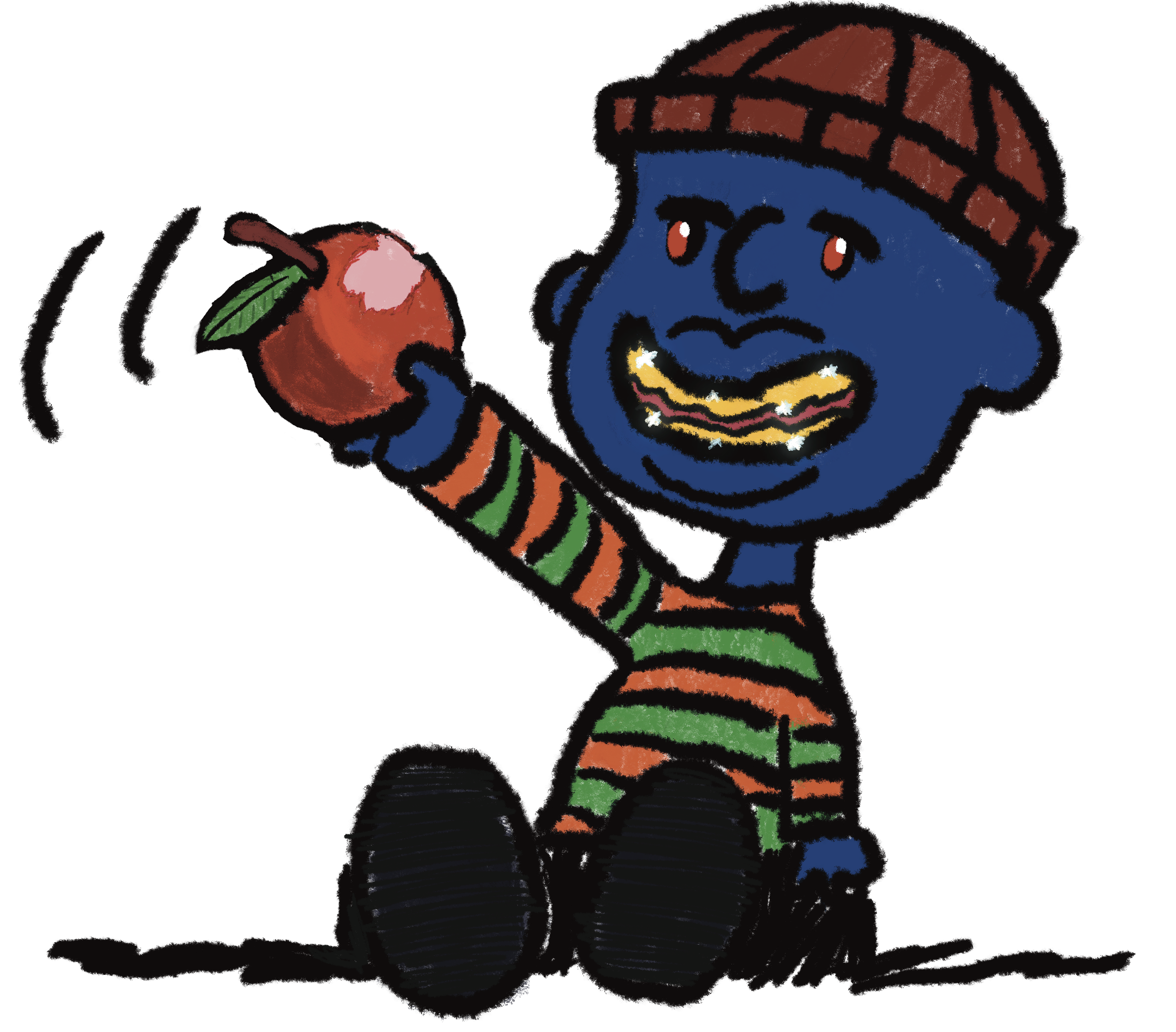
![Stairway To Heaven: Dream Logic vs. Mythological Reclamation [How to Explain A World]](https://images.squarespace-cdn.com/content/v1/5f98c34db9ff5518937cd004/1726019387290-DPZTGOTM6QQFXPIQF9OO/IMANI+PAINTING.png)






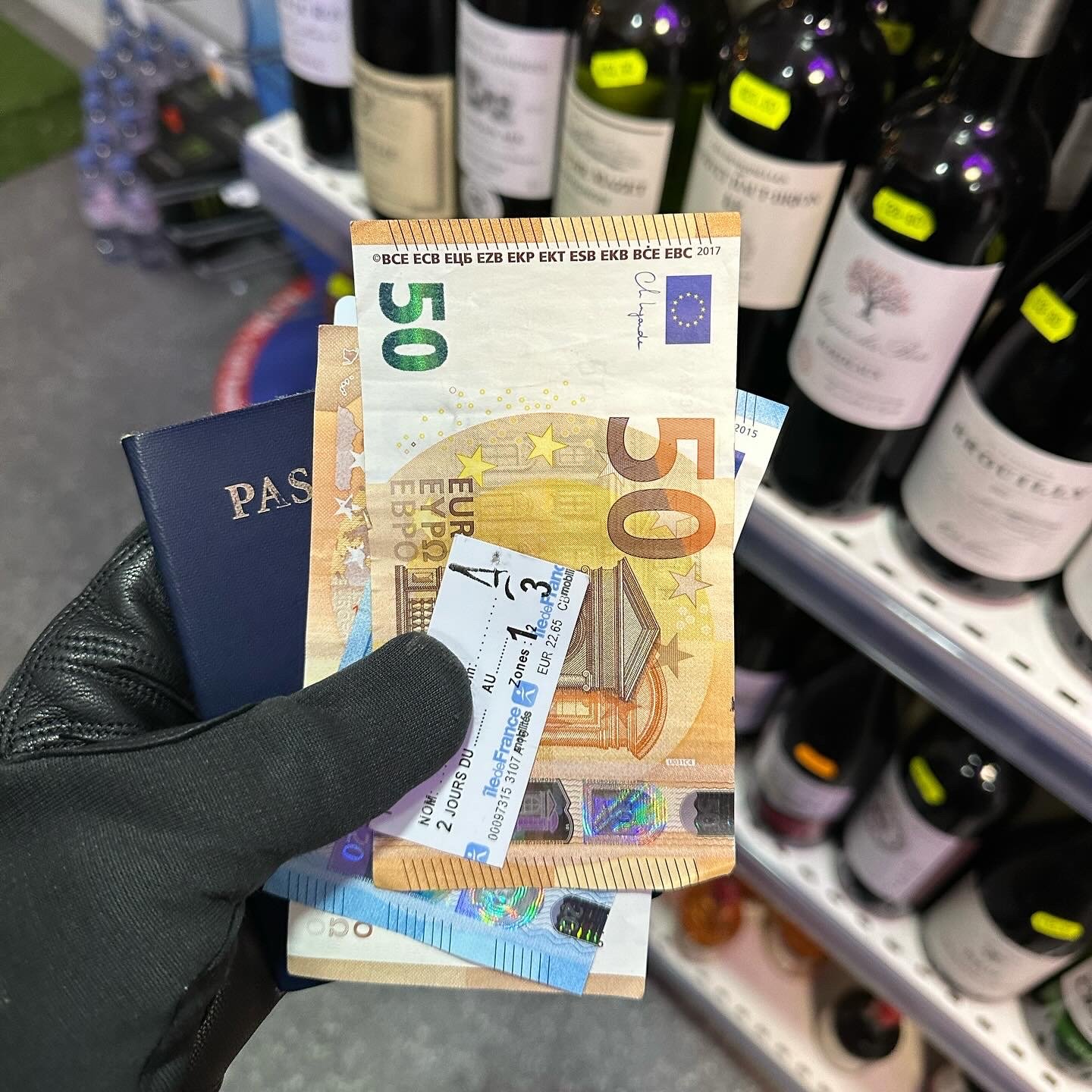
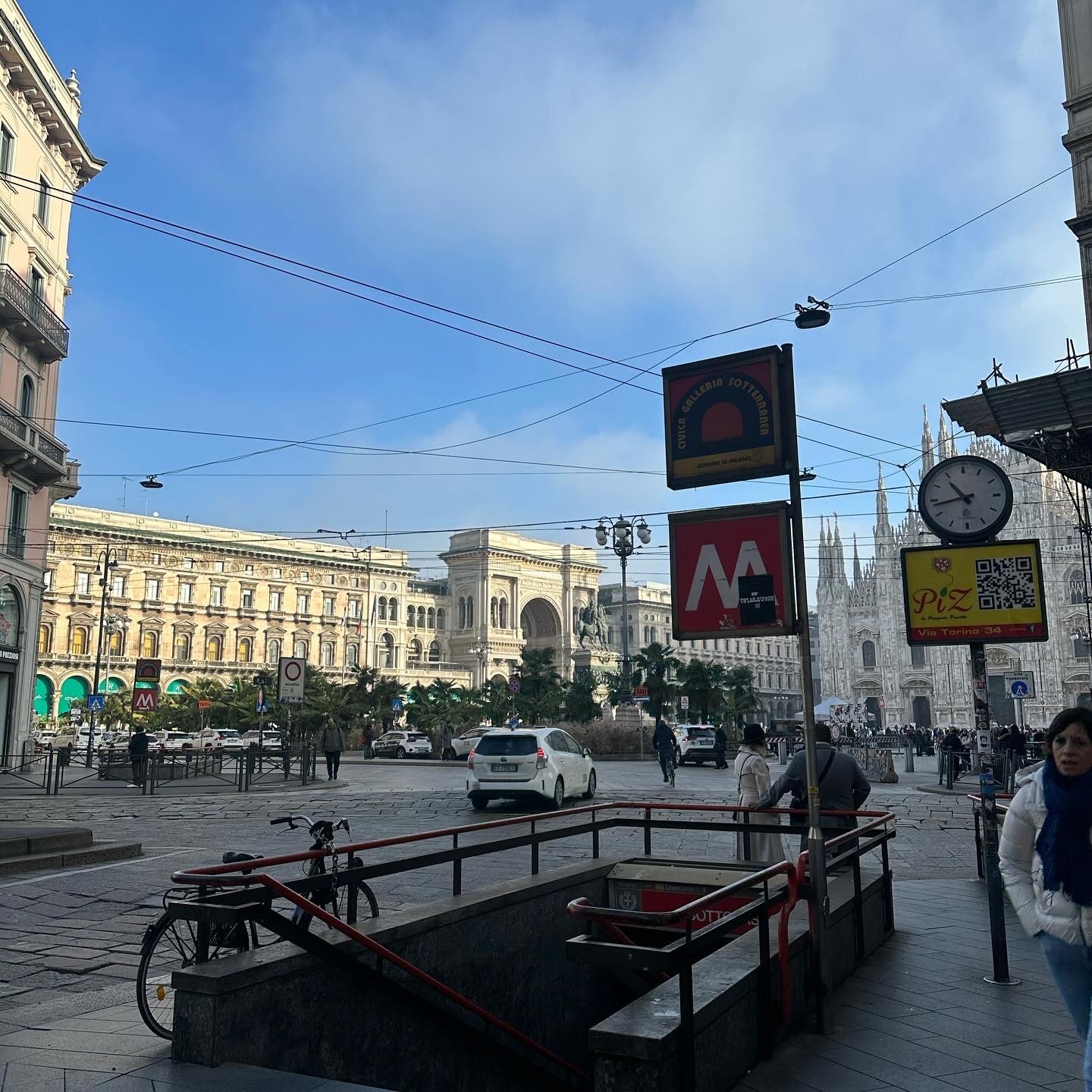
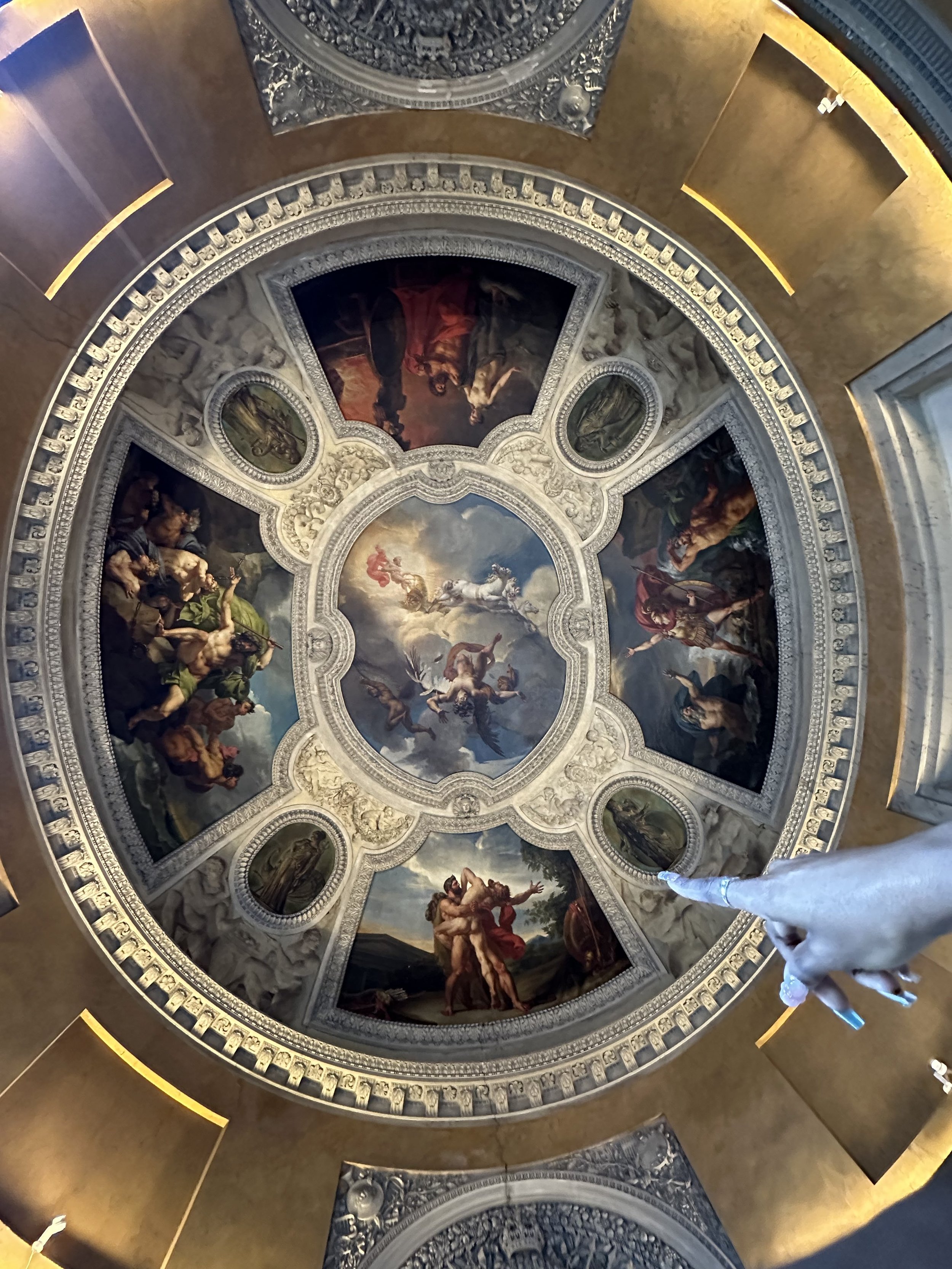
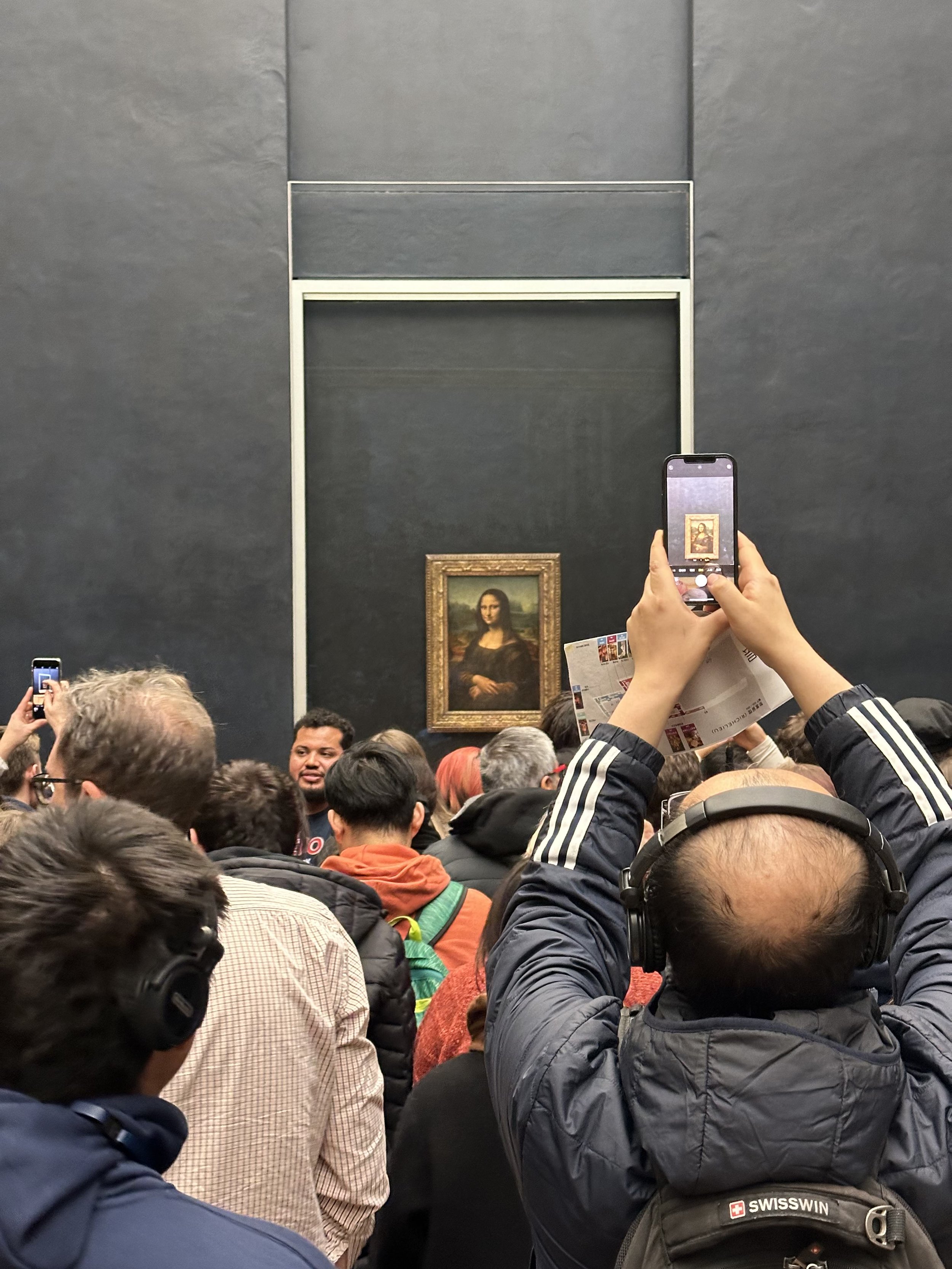
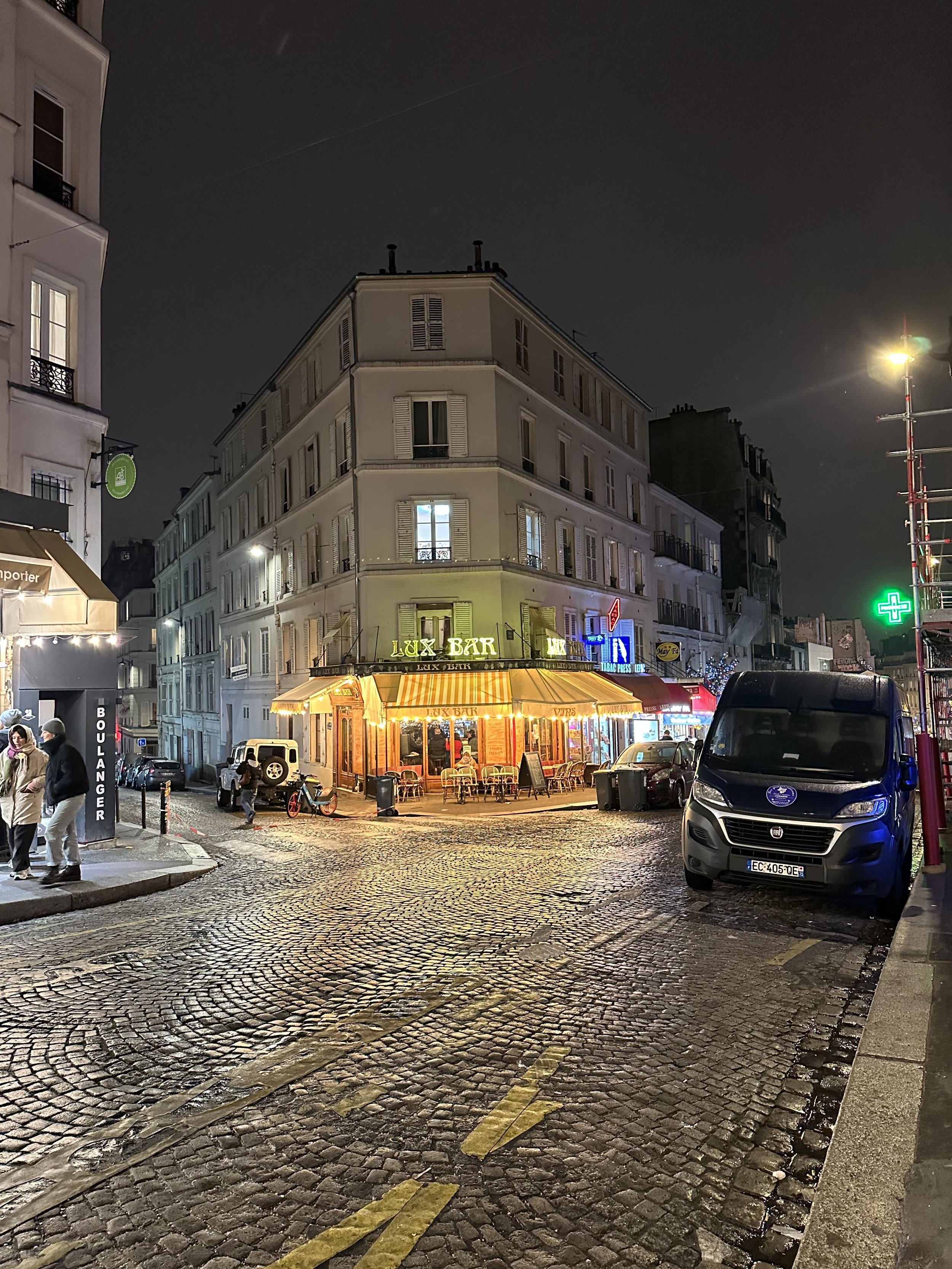
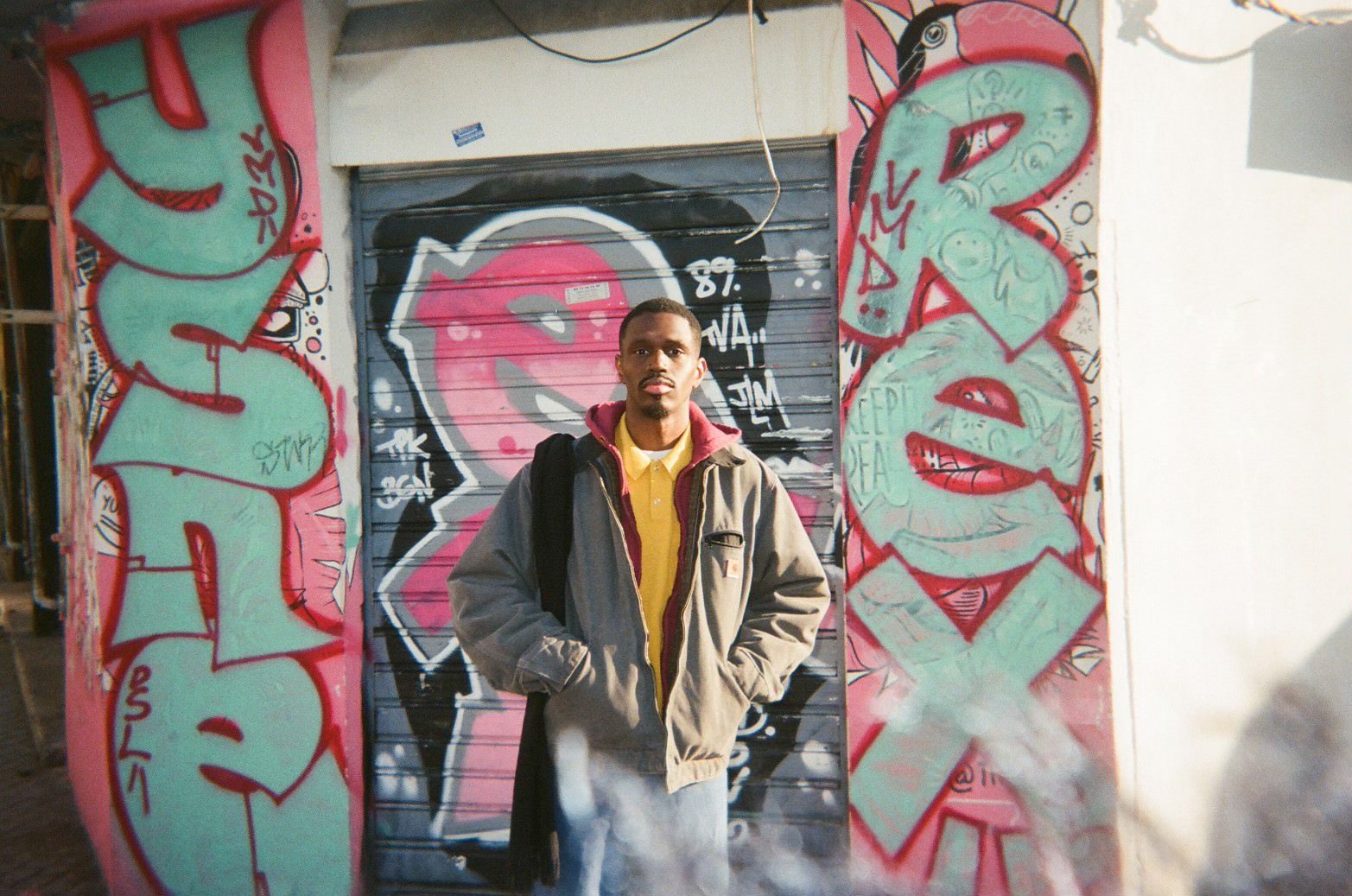
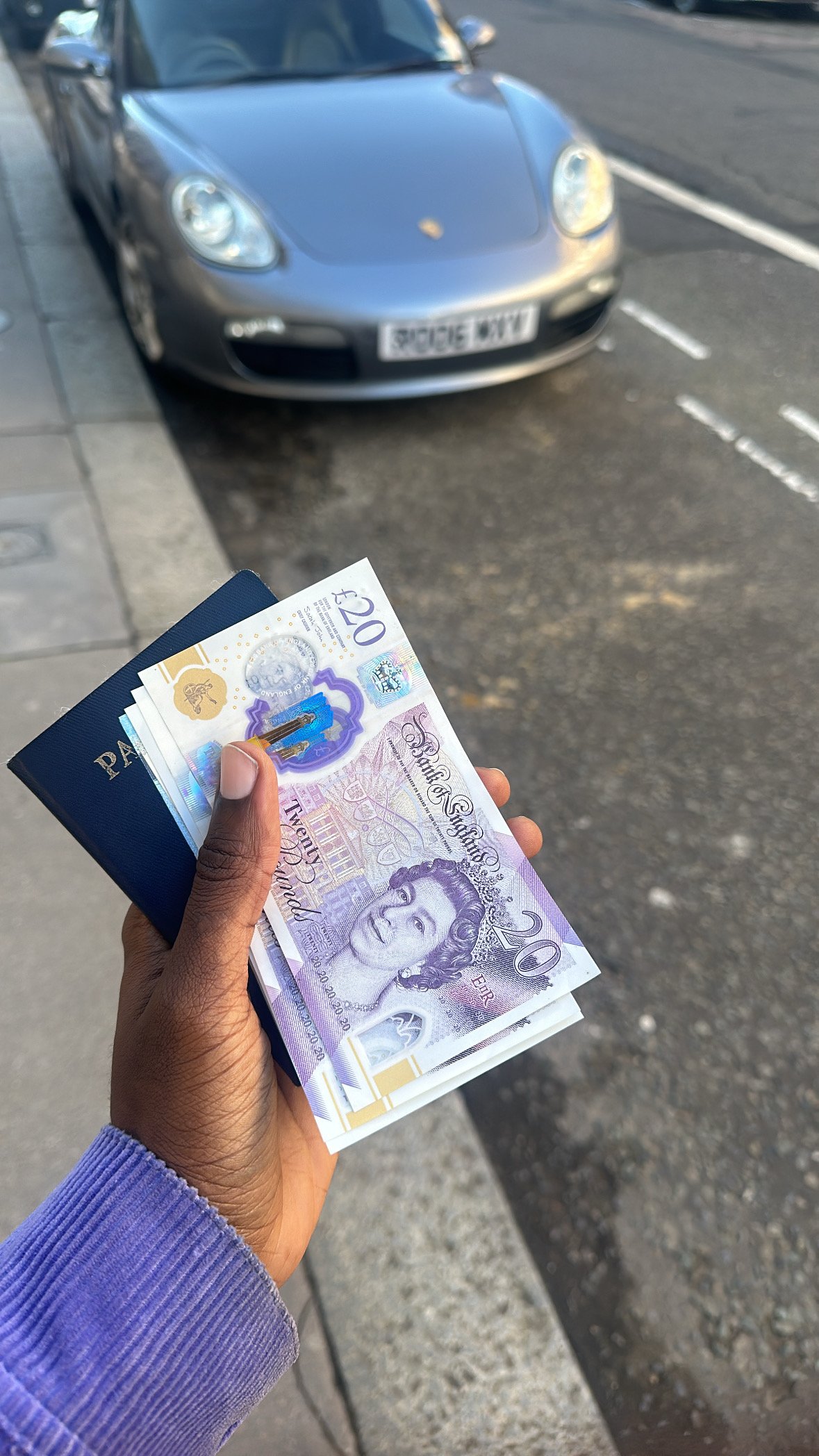

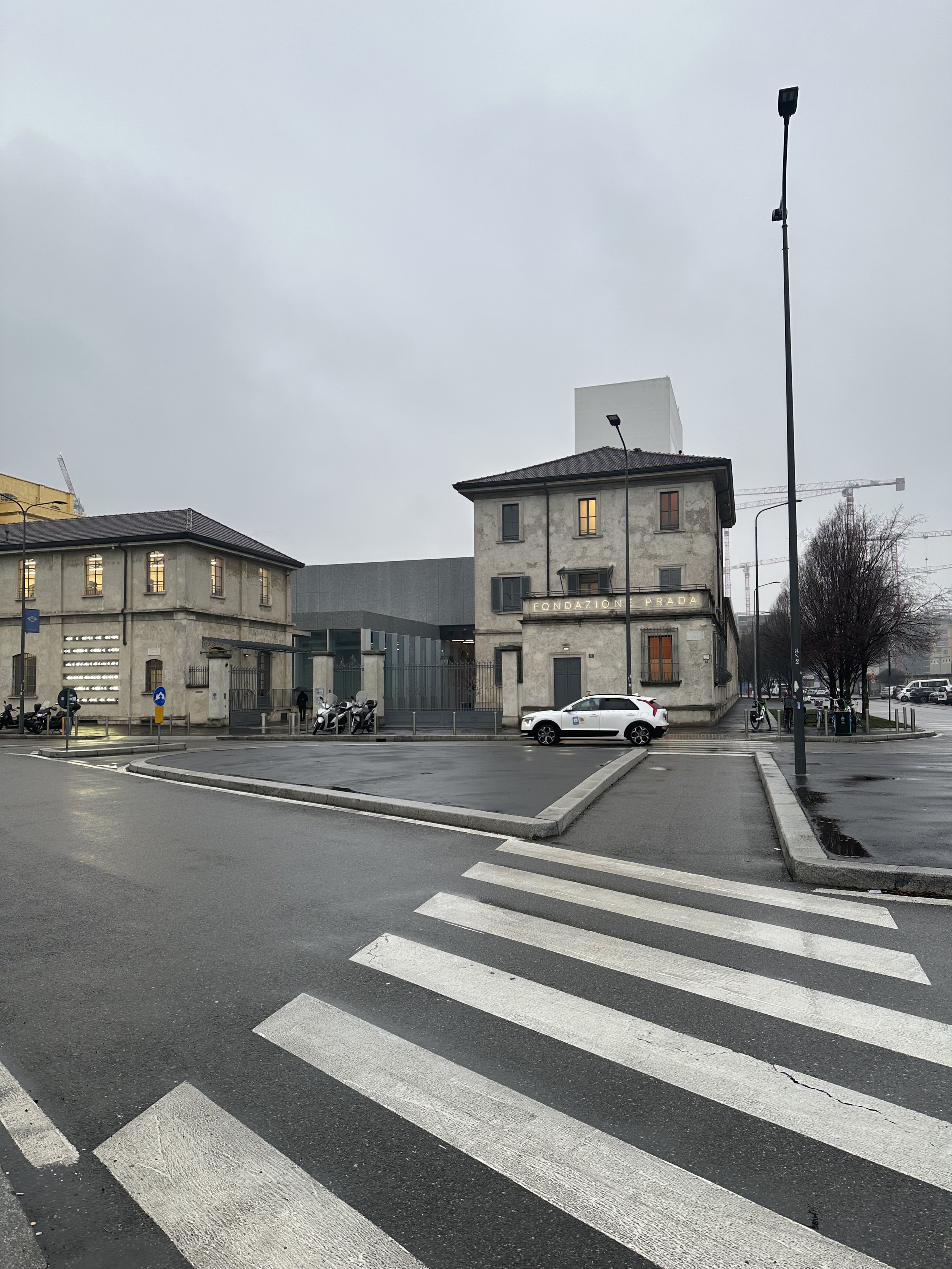
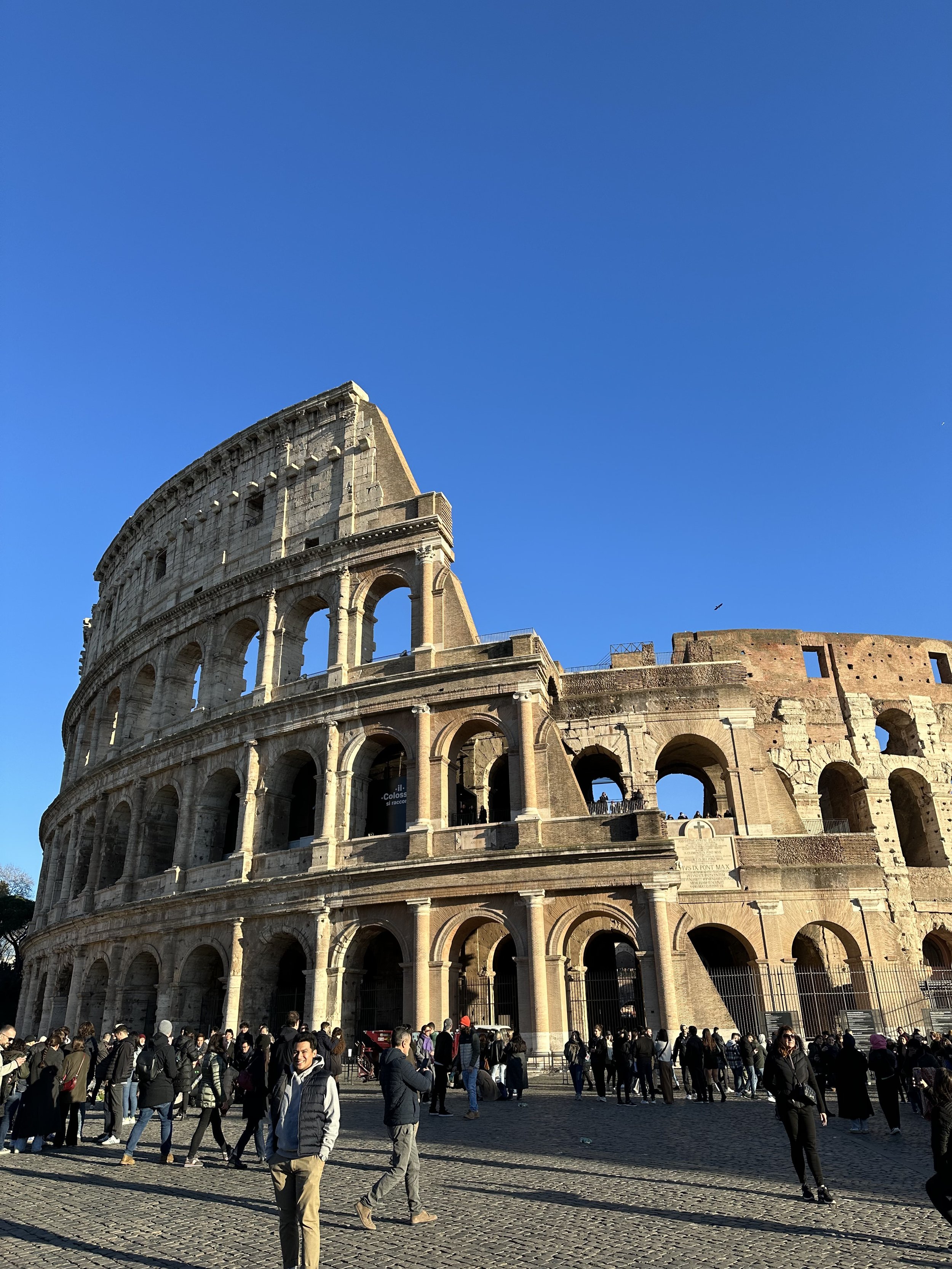
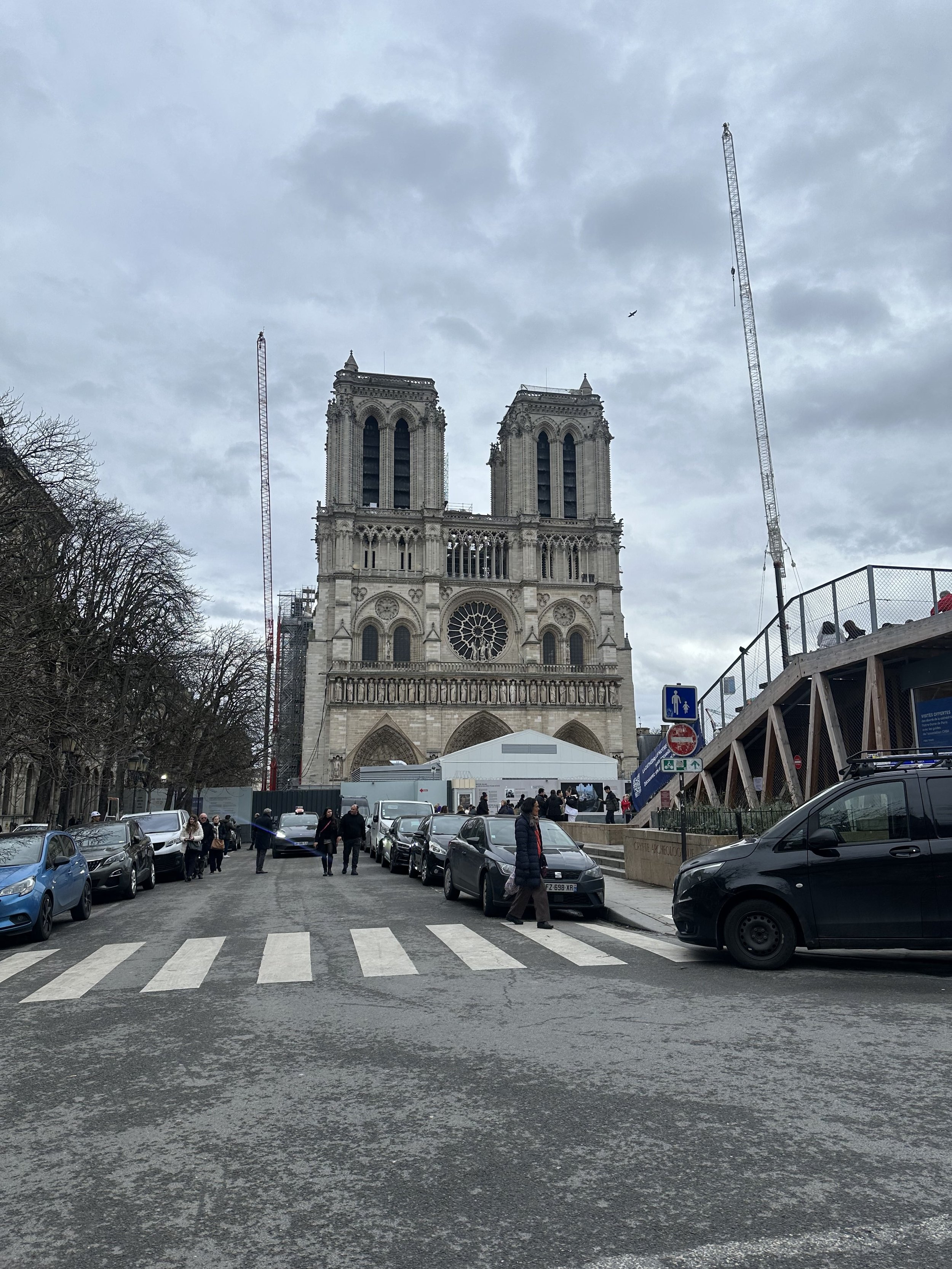
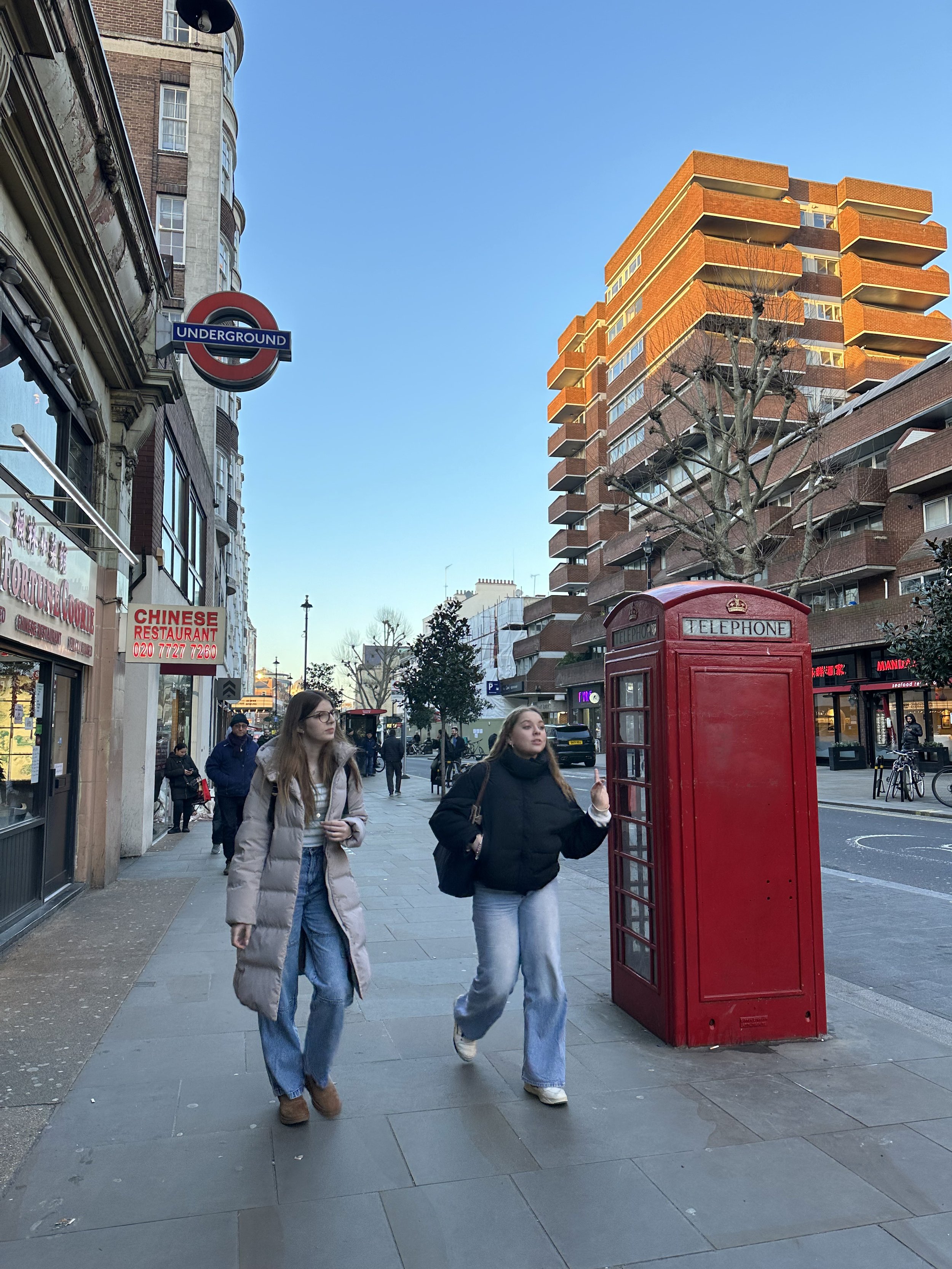
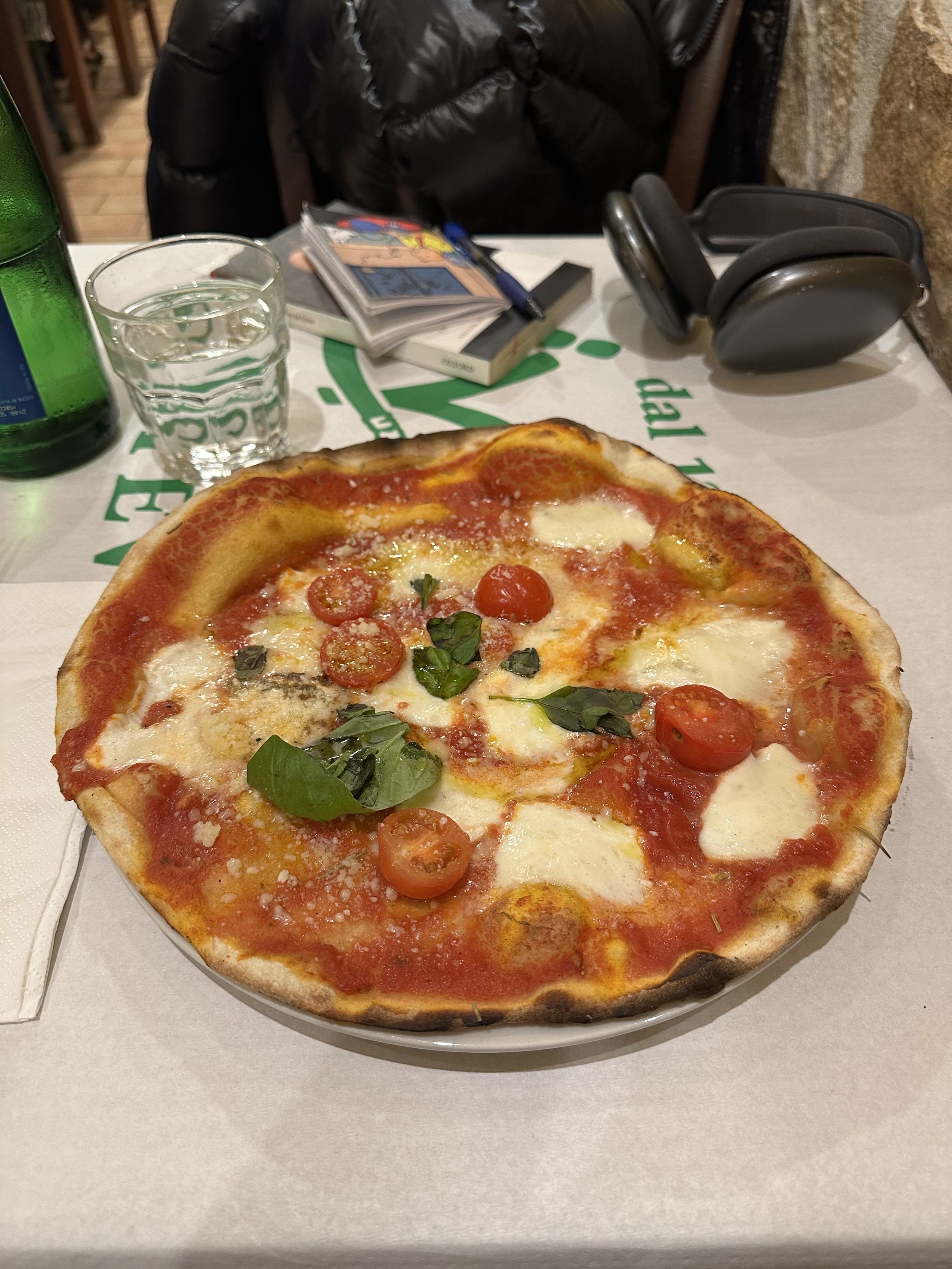
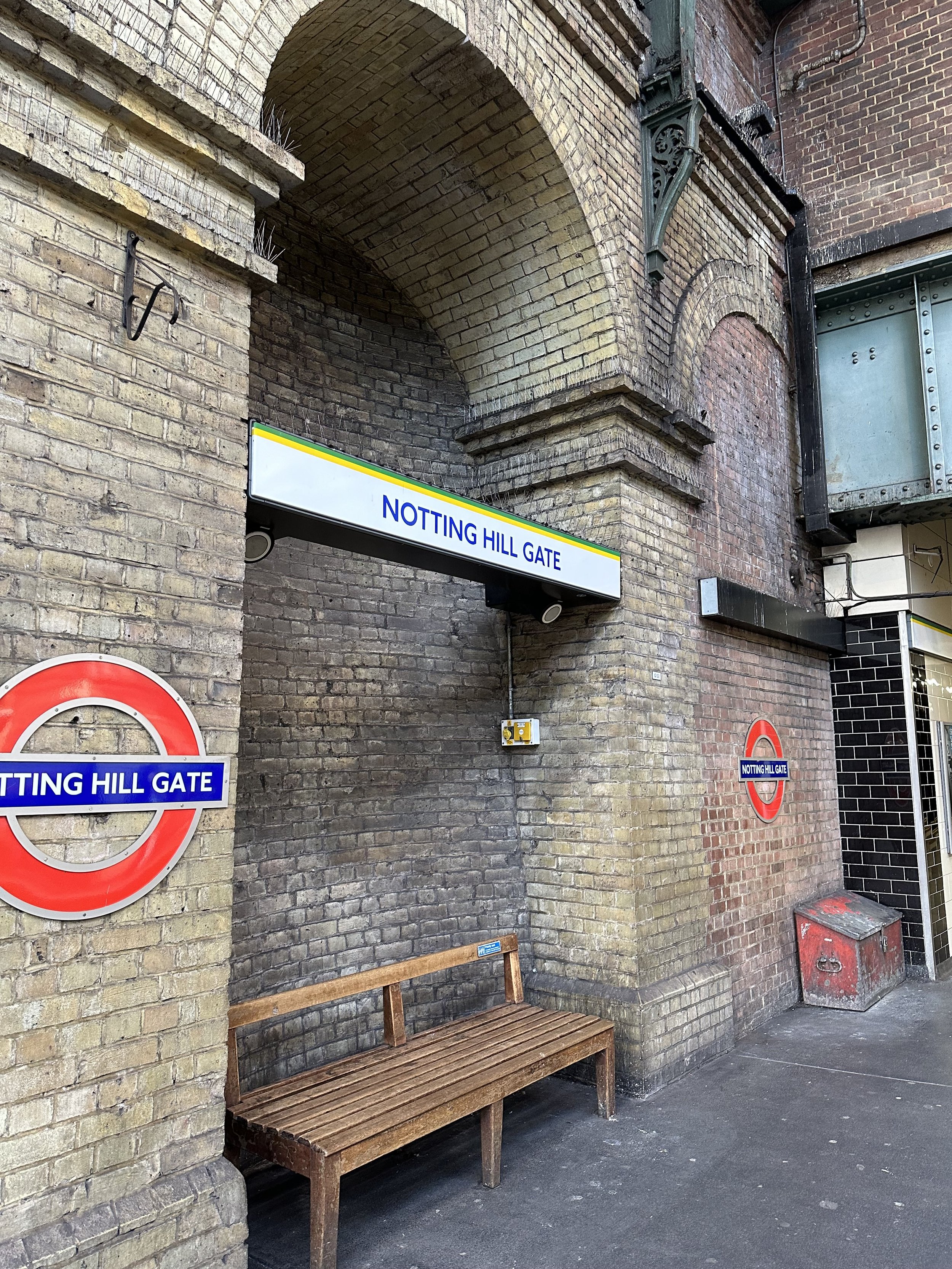
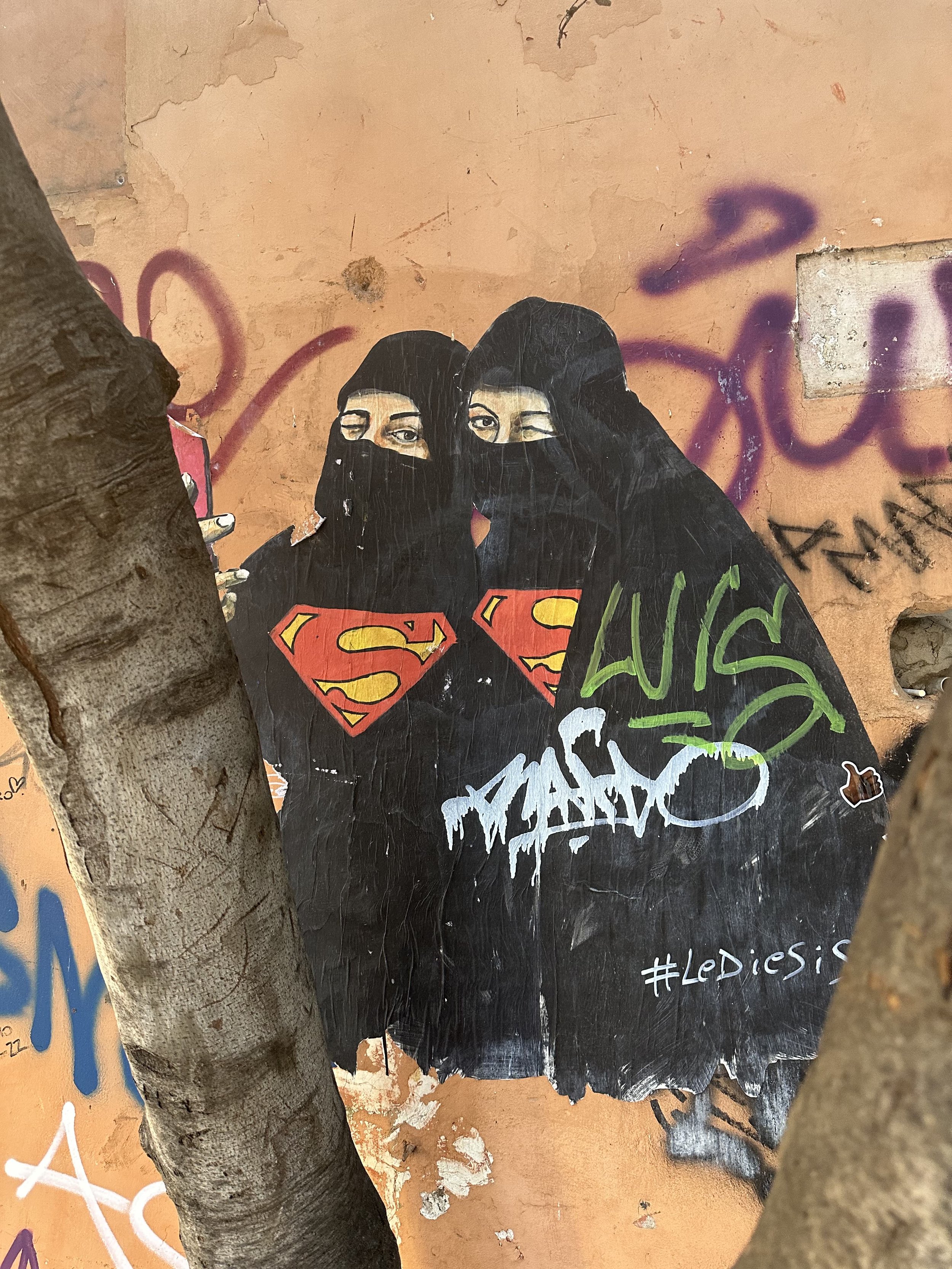
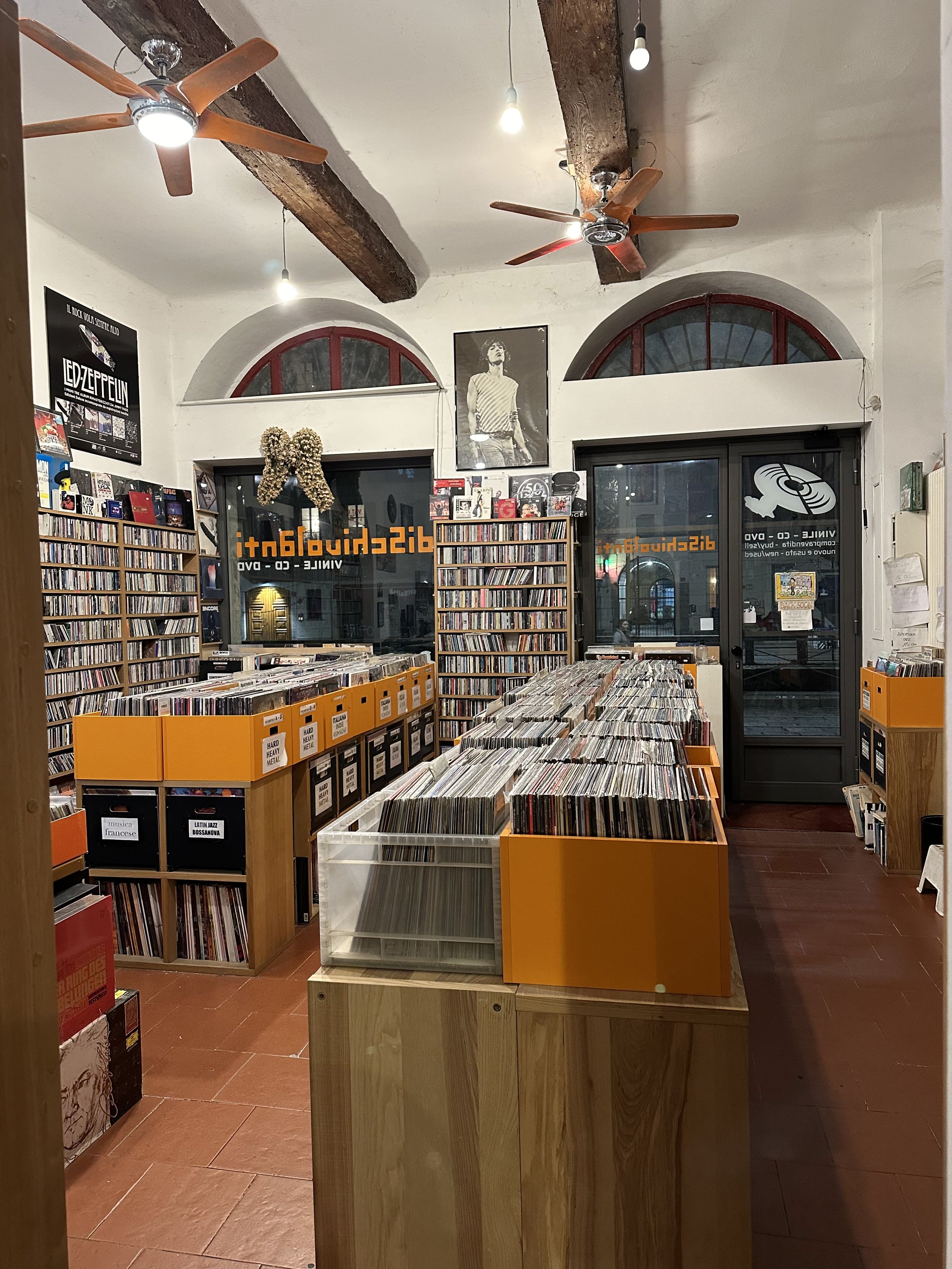
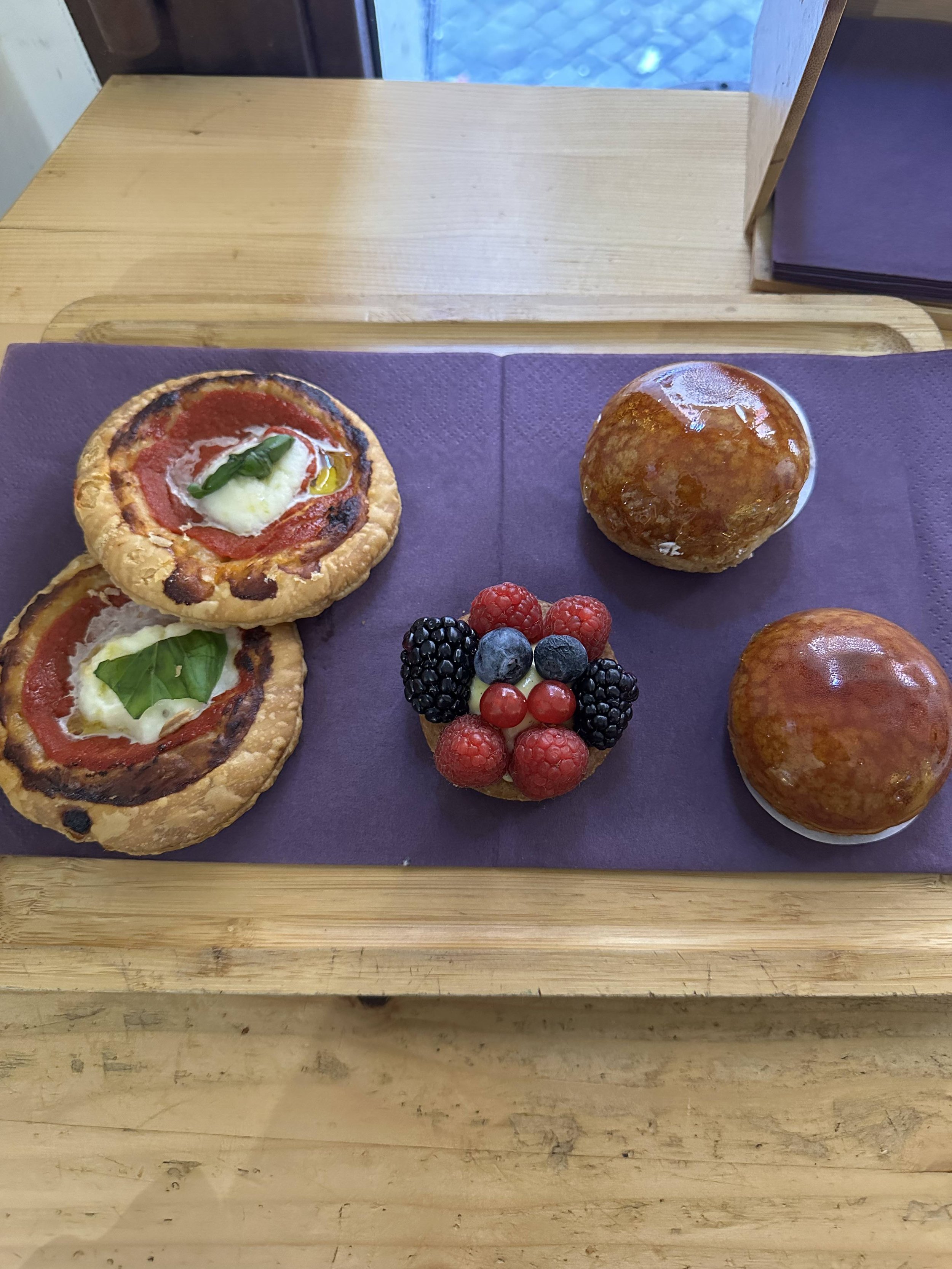
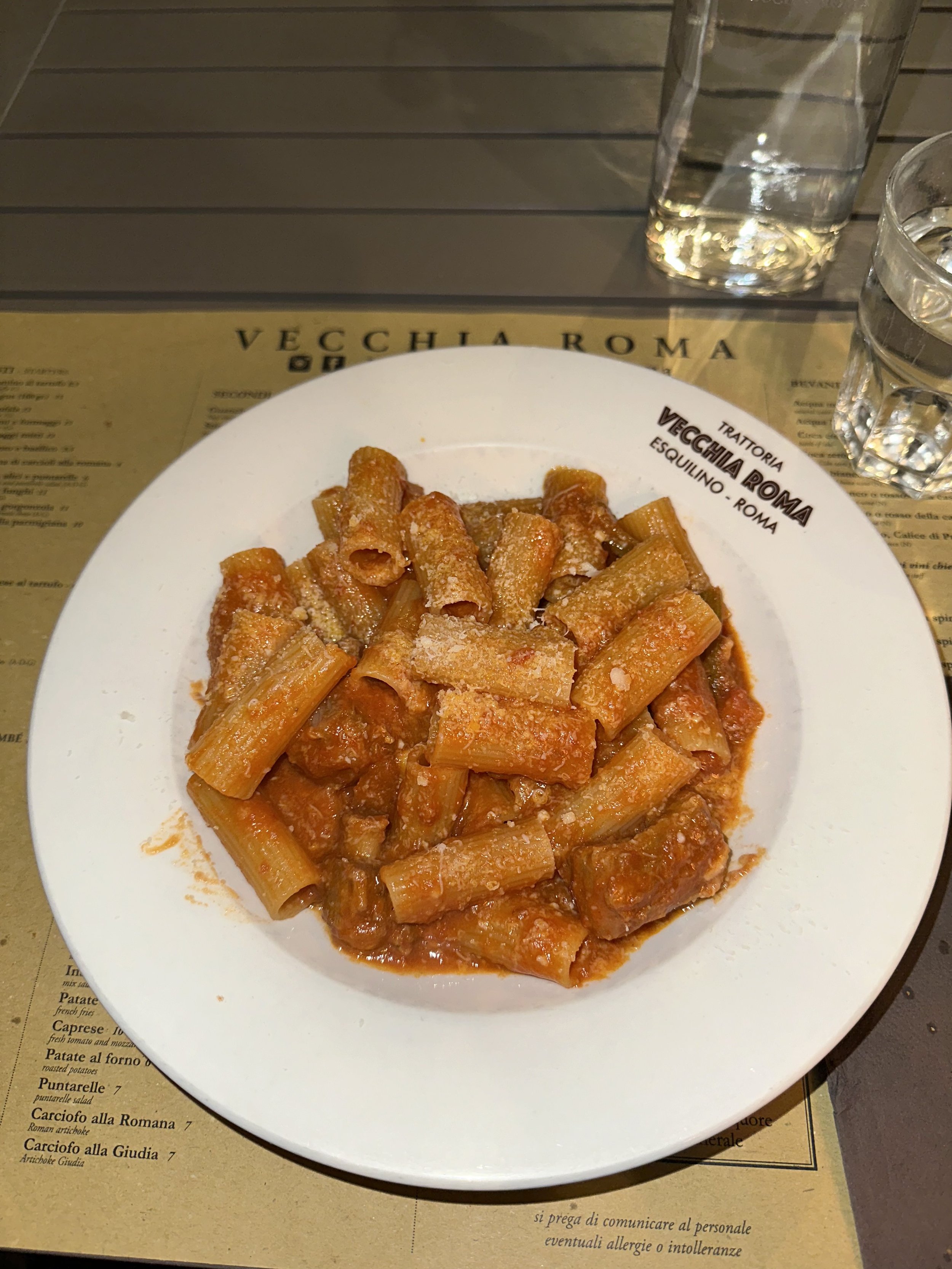
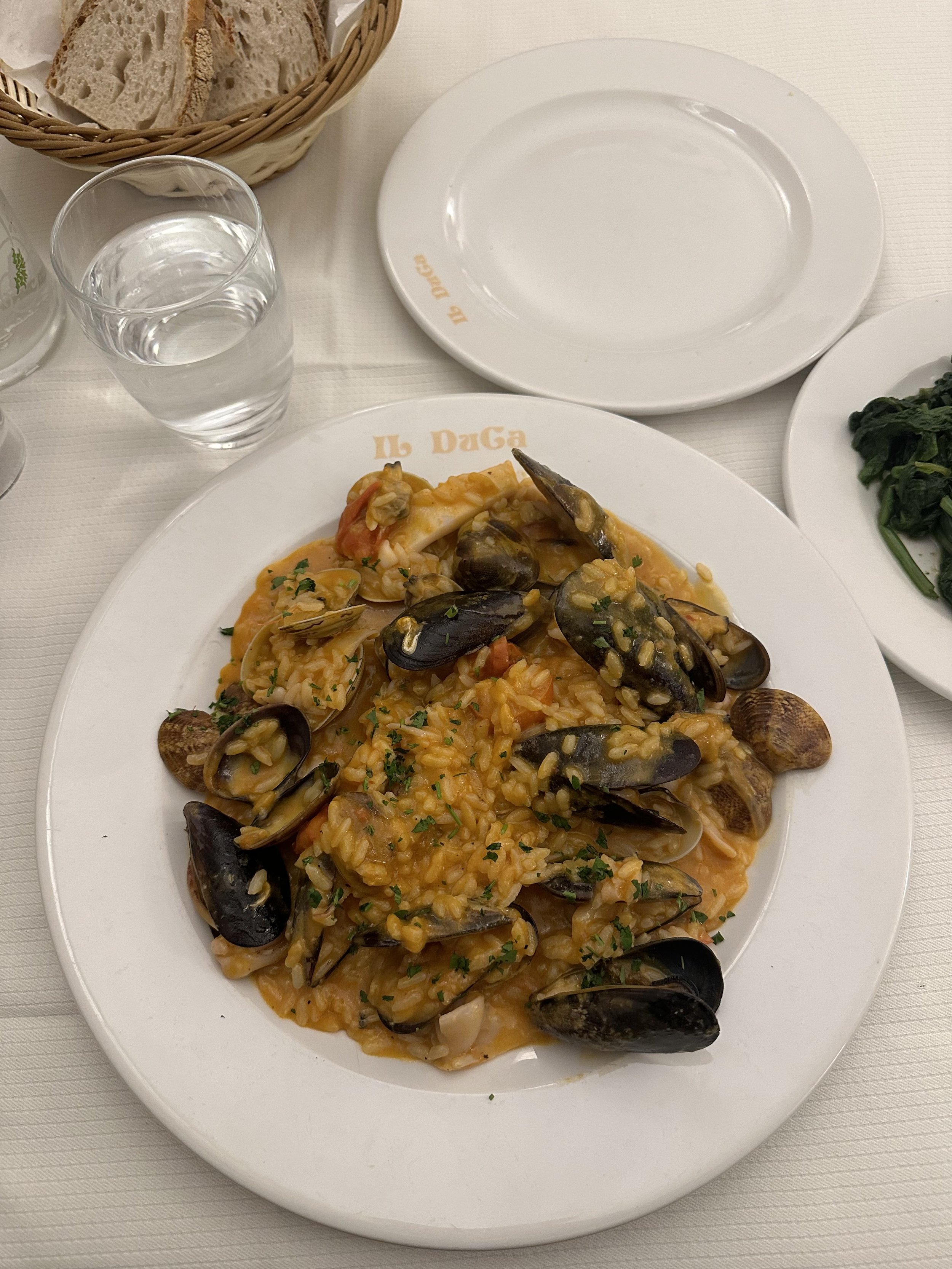
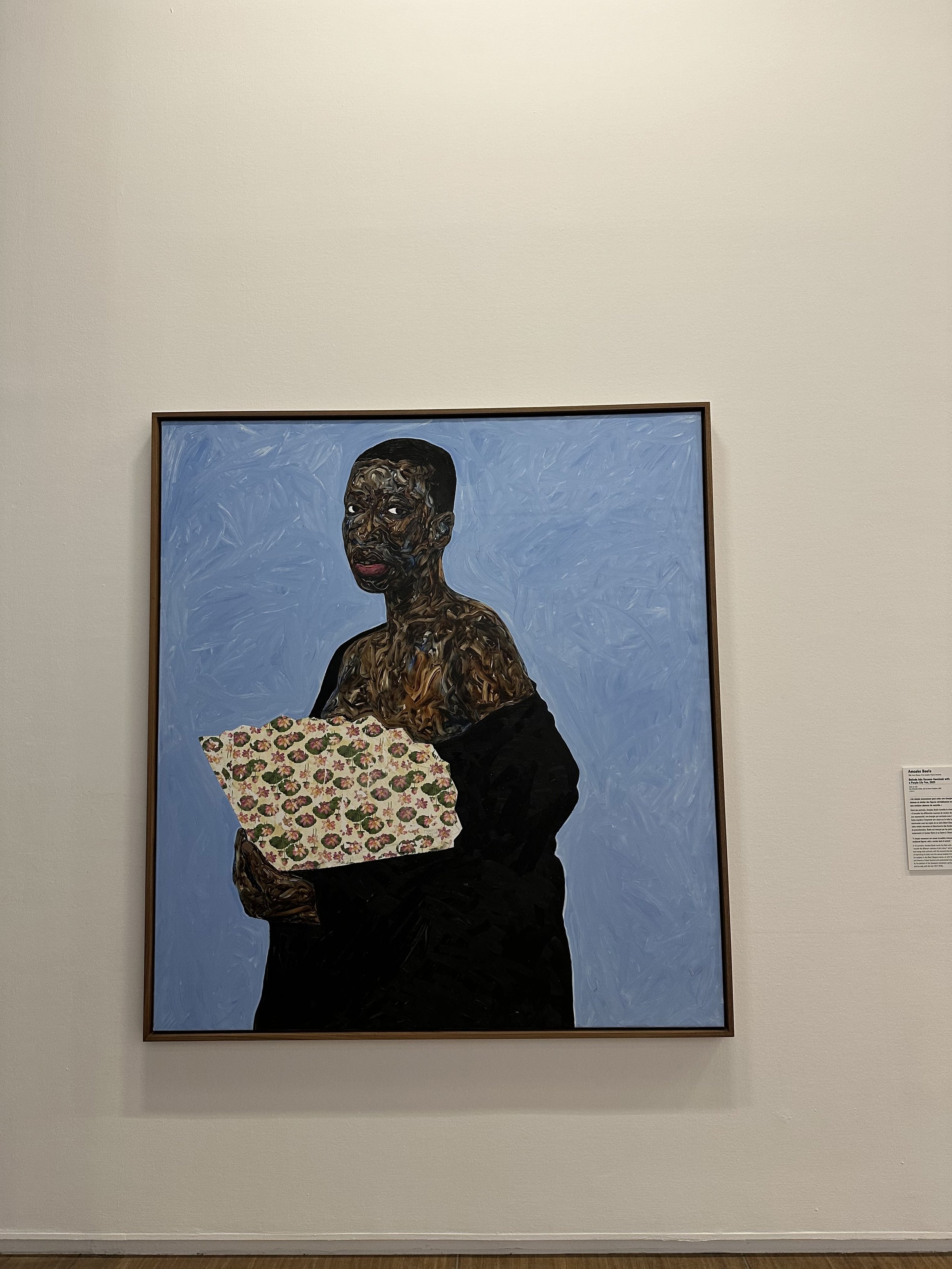
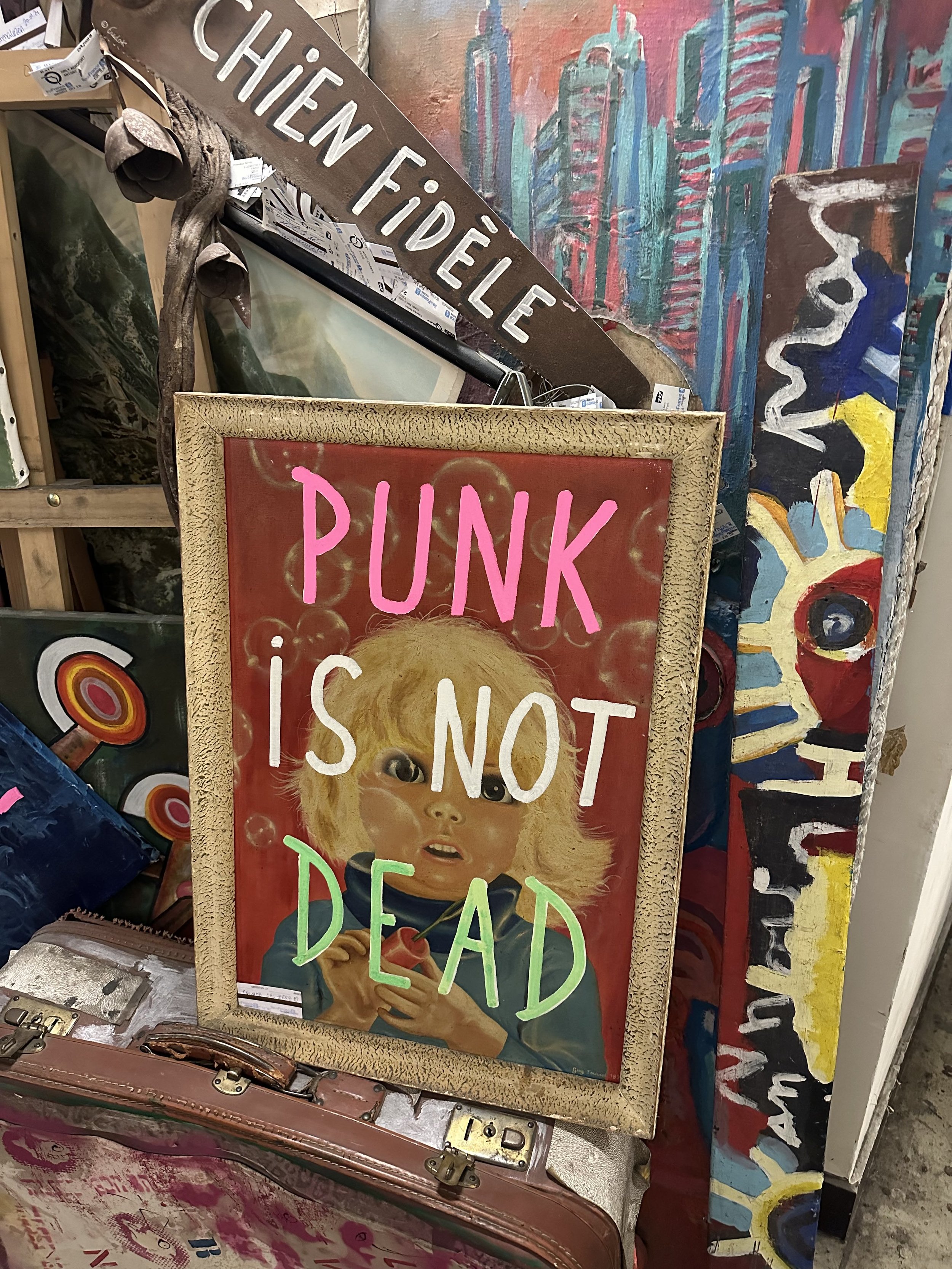
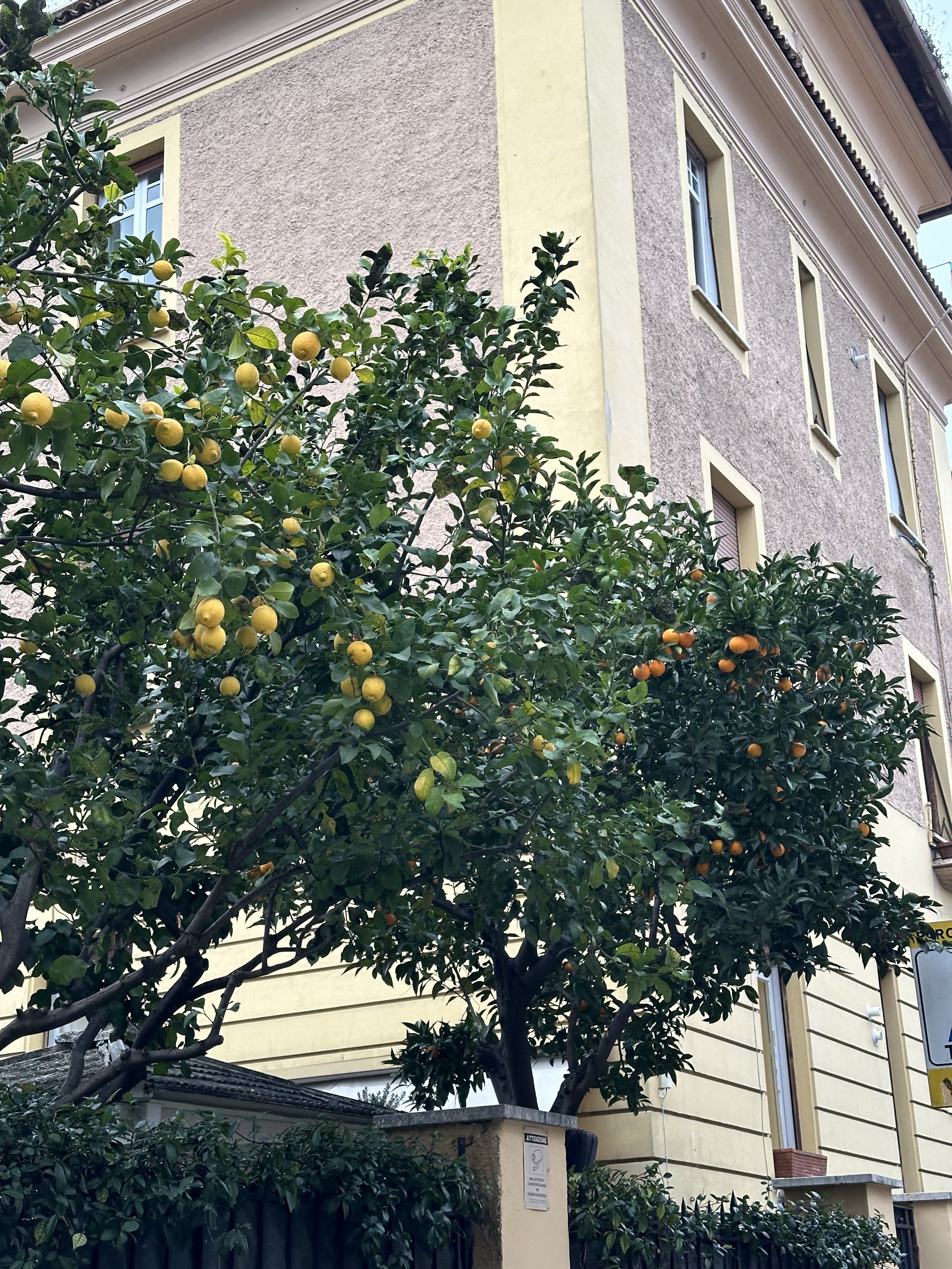
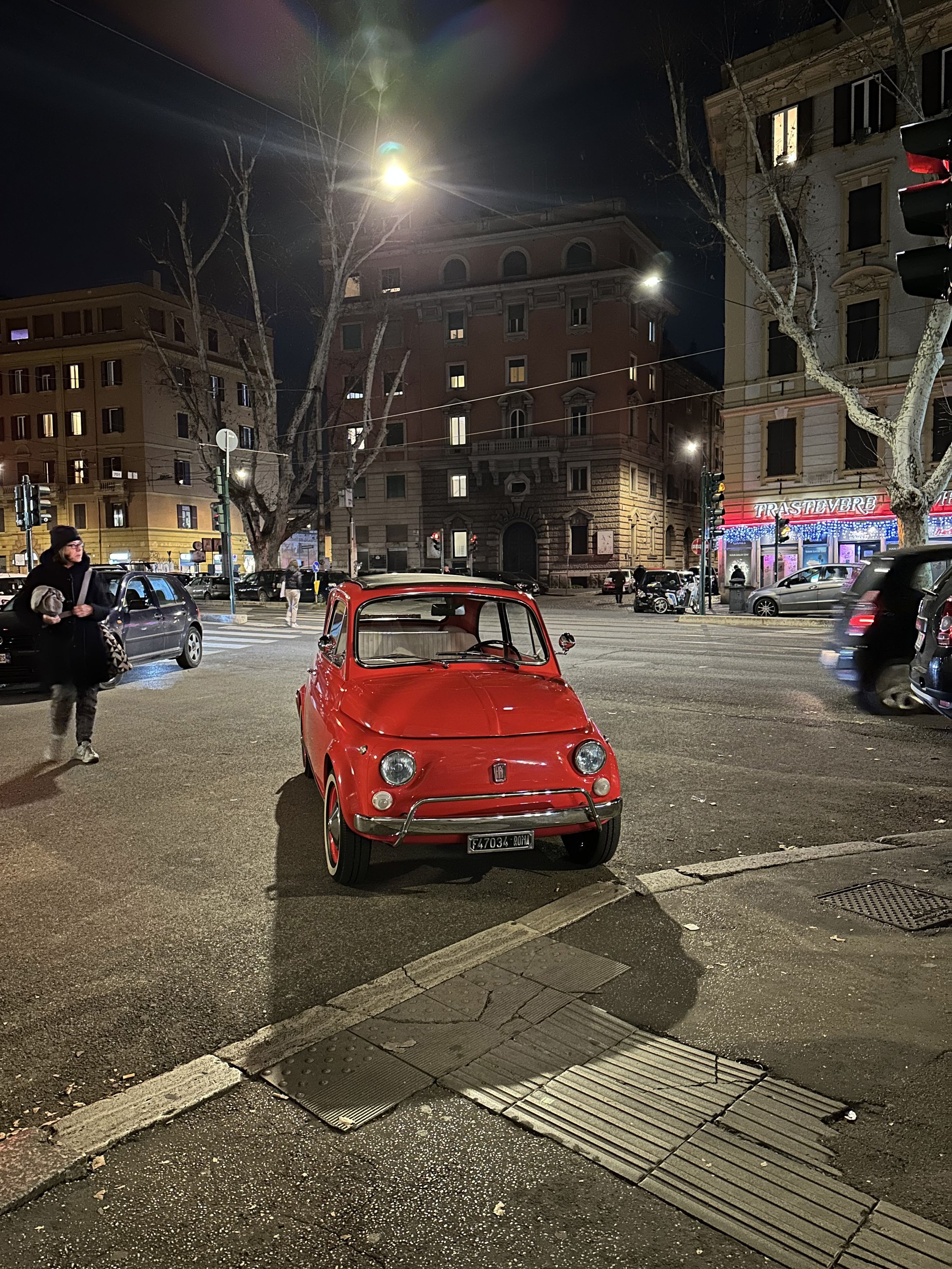
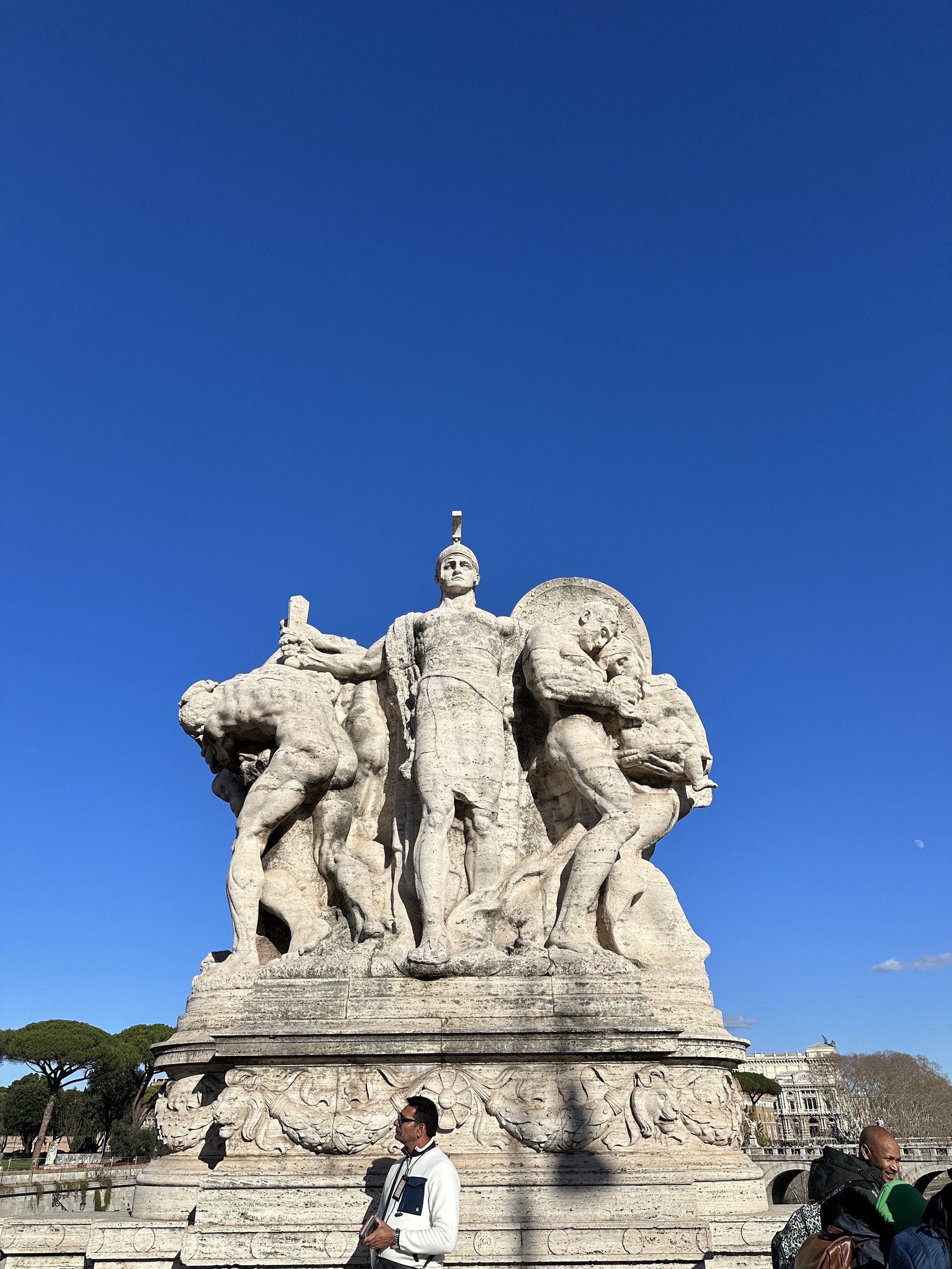
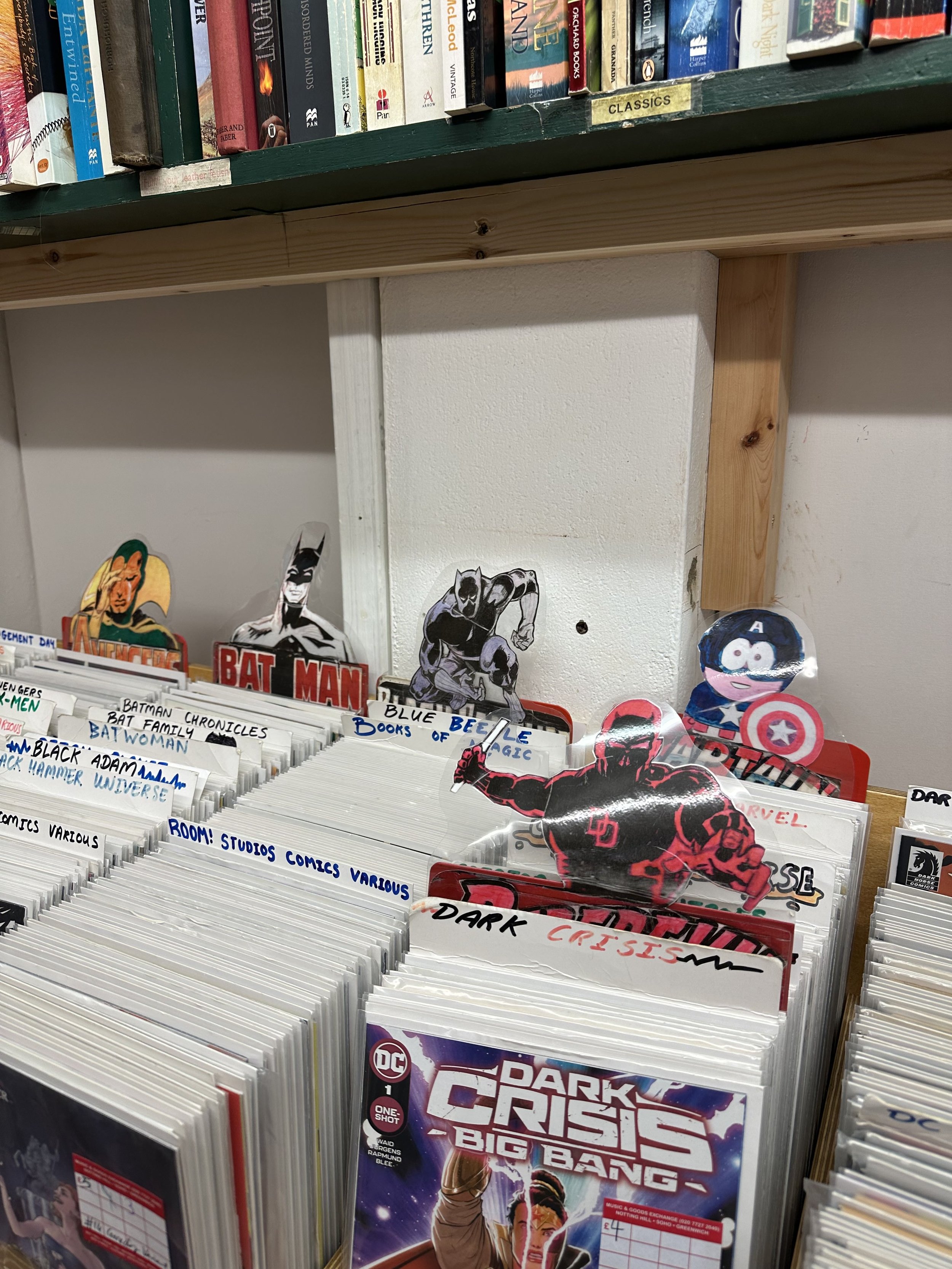

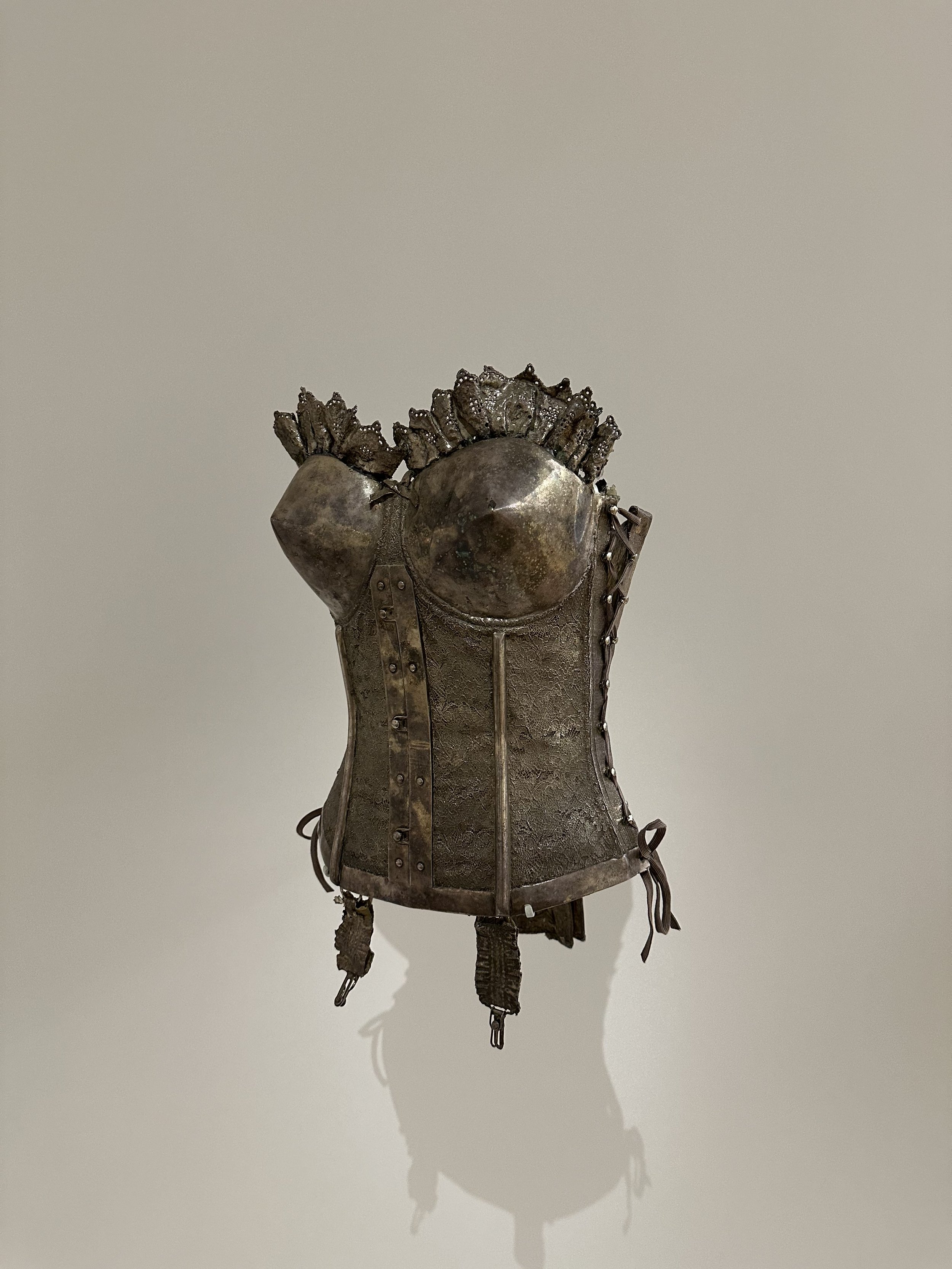
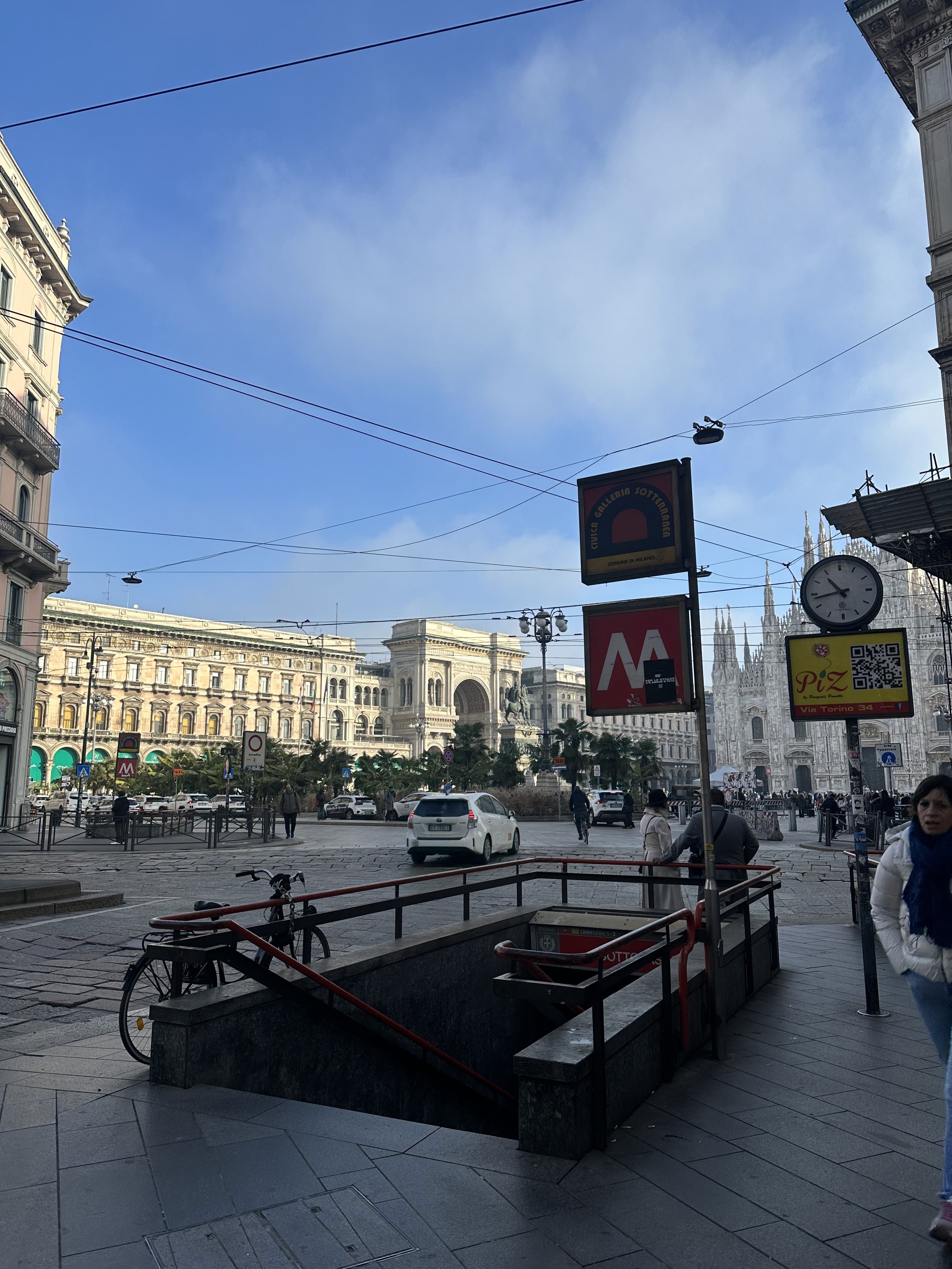
![Foreign Chaos [COP’s CITY/COP CITY]](https://images.squarespace-cdn.com/content/v1/5f98c34db9ff5518937cd004/1686688116912-4Y0RU0STZ1Y2MGQ046H7/foreign+chaos.jpeg)
